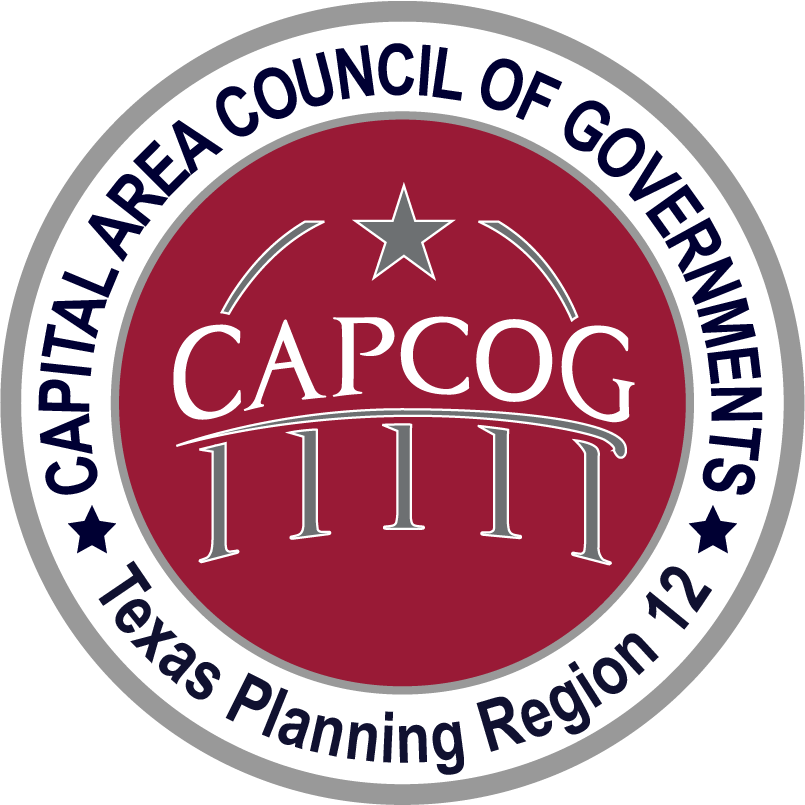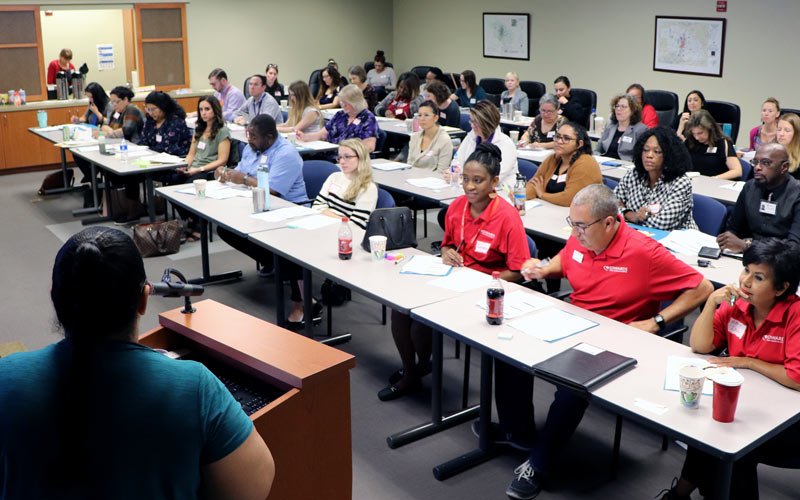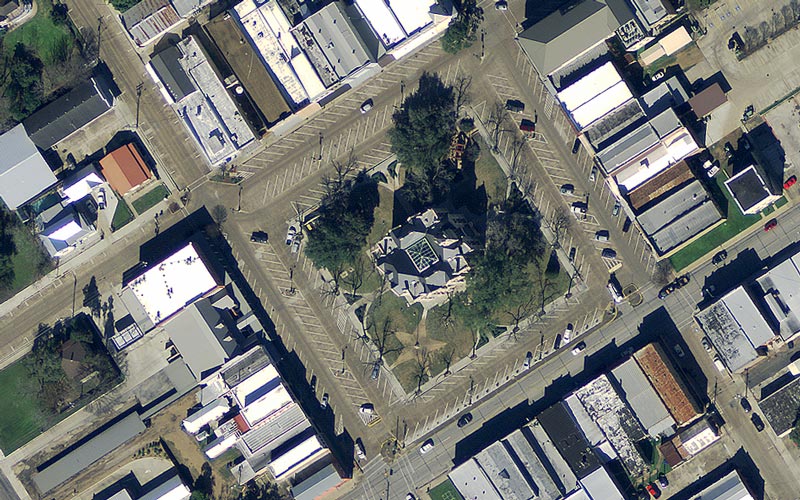- Who We Are
- What We Do
- Divisions
- Transparency
- News
- Events
- Regional Directory
- Careers
Serving Bastrop, Blanco, Burnet, Caldwell, Fayette, Hays, Lee, Llano, Travis, and Williamson Counties
MENU

Homeland Security Task Force (HSTF)
The Homeland Security Task Force was formed by CAPCOG to primarily assist staff in planning, coordinating, evaluating, and recommending projects for grants received from the State of Texas. In addition, it assists with the development of the Region’s Homeland Security Strategic Plan, Long-Term Interoperability Plan, training of first responders, and coordination of regional projects.
Policy & Advisory Committees
Purpose
The mission of the CAPCOG Homeland Security Task Force is to facilitate regional homeland security activities among local jurisdictions, including, but not limited to: planning, training, funding, and mutual aid consistent with the State of Texas Emergency Management Plan and to maximize effective and efficient use of resources.
- To review and comment for the CAPCOG Executive Committee on applications requesting state or federal funds.
- To advise CAPCOG’s member cities, counties, and special districts, directly or through the CAPCOG Executive Committee, on matters within their jurisdiction pertaining to homeland security and emergency management.
- To prepare and submit for CAPCOG Executive Committee approval regional plans and procedures for dealing with homeland security and emergency management issues that require cooperation and coordinated activity by multiple CAPCOG jurisdictions.
- To conduct training workshops
The task force also plays a vital role in ensuring that the communities and residents are protected and prepared for large scale emergencies. Training for first responders is coordinated by a work group of the task force. Often the actual trainers are members on the task force. HSTF is also responsible for developing or assisting local jurisdictions to establish exercise criteria and participate in the exercises.
Read the CAPCOG Homeland Security Strategic Framework.
Membership and Bylaws
Members for the HSTF are appointed by the CAPCOG Executive Committee and are from emergency management organizations of each county, public safety first responders and public health and medical representation. The 27 members come from large and small municipal and county public safety agency and other regional organizations and governments to include public health institutions, education institutions and more.
Meetings
The task force generally meets the first Thursday each month and has a number of sub committees that conduct a number of planning meeting for specific homeland security issues. Its meets are open to the public and widely attend by a number of public health and safety organizations not represented on the task force but still provide valuable input. Check the events section below for upcoming meeting details, such as time, date and location.
Contact Kate Barrett for agendas and minutes for the task force.
Related
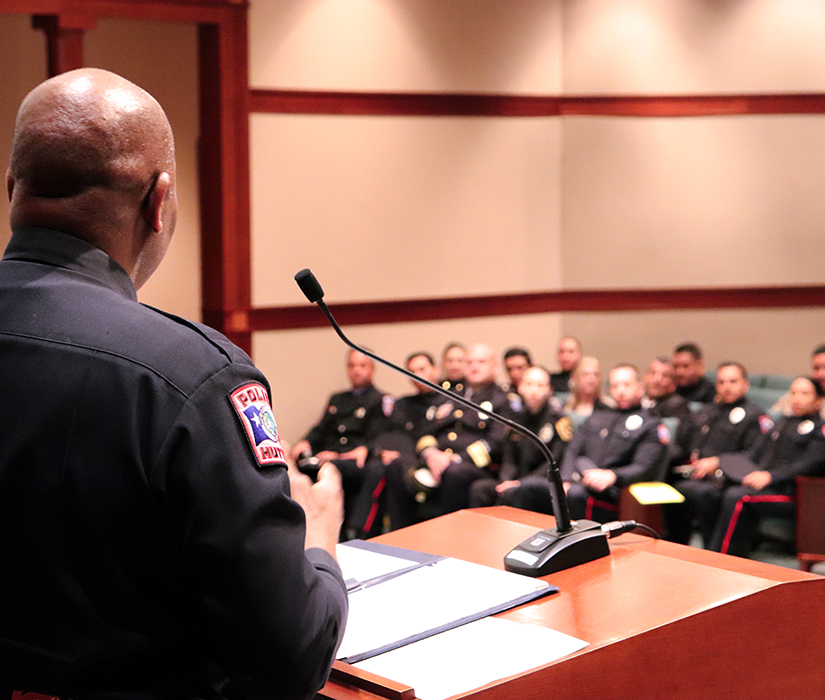
RLEA, Hutto graduate night BPOC No. 99
CAPCOG’s Regional Law Enforcement Academy (RLEA) in April graduated Basic Peace Officer Course (BPOC) No. 99 hosted and managed by…Apr 25, 2024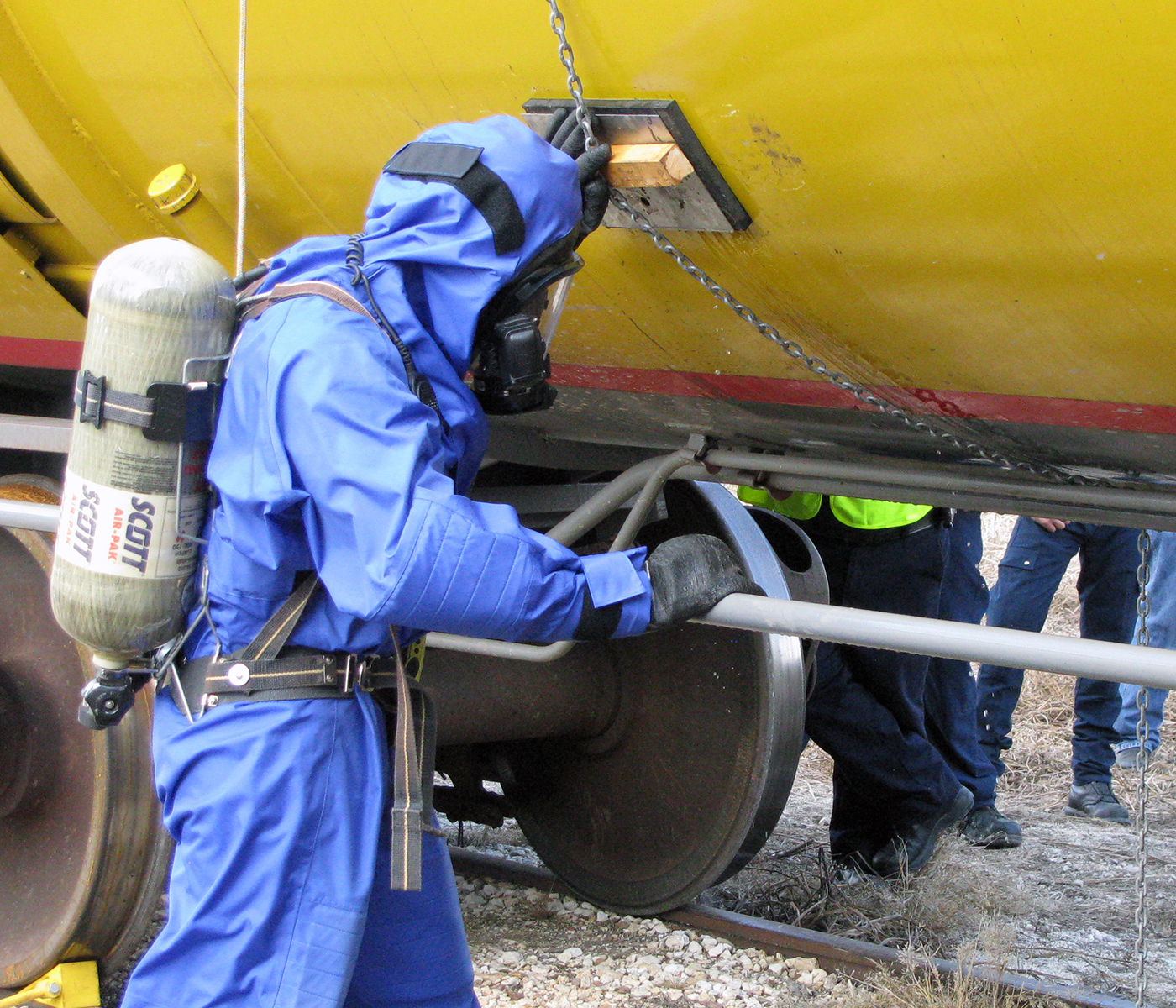
CAPCOG recommends SHSP projects
CAPCOG”s Executive Committee recommended the region’s prioritization list of 18 projects seeking funds from the State Homeland Security Program (SHSP)…Apr 17, 2024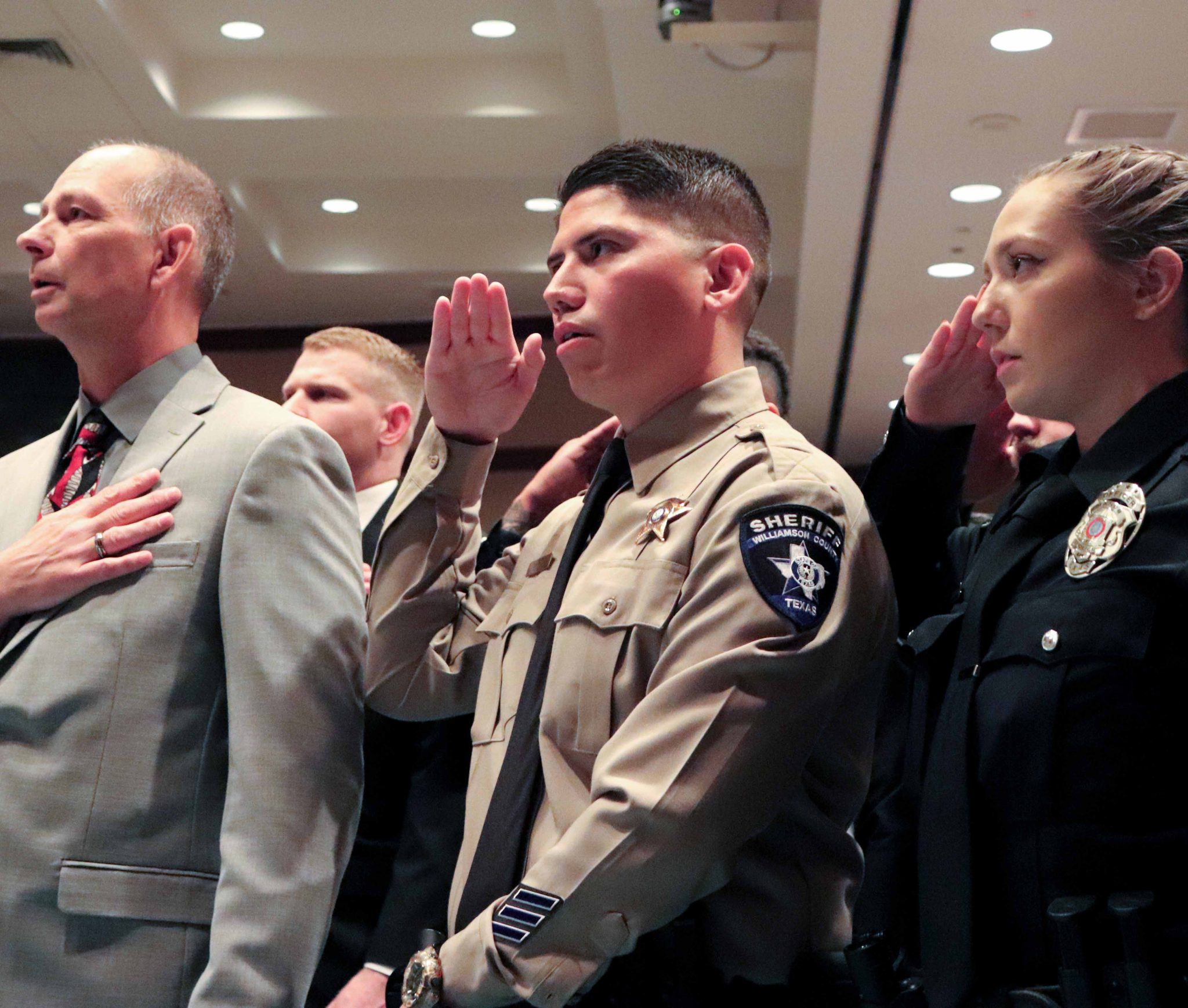
RLEA graduates 30 in Class No. 100
The CAPCOG Regional Law Enforcement Academy graduated its 100th class in March; the milestone graduation builds on decades of educating…Apr 1, 2024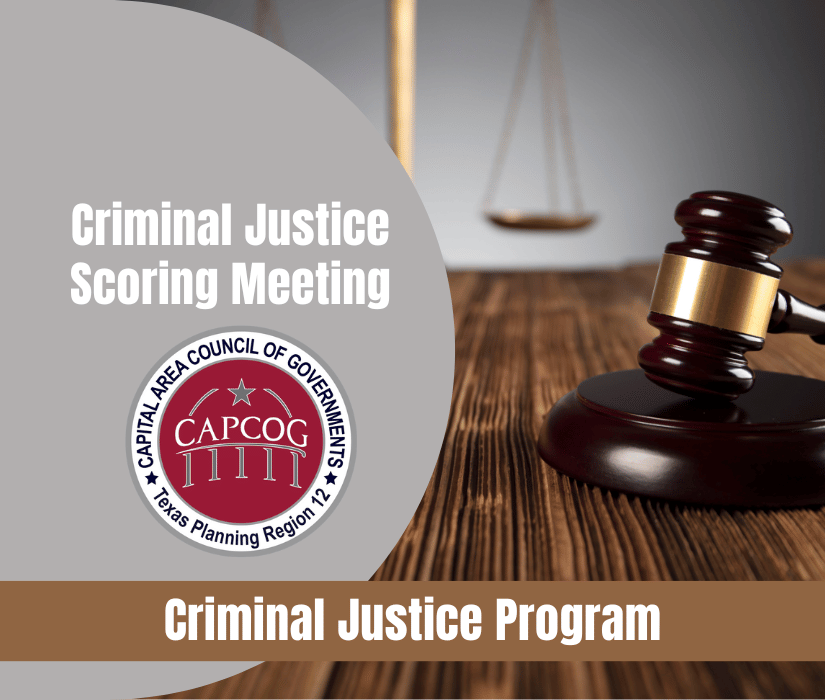
CAPCOG announces criminal justice grant presentations
The CAPCOG Criminal Justice Program has announced that grant application presentations will take place on April 1, 2024, for the…Mar 14, 2024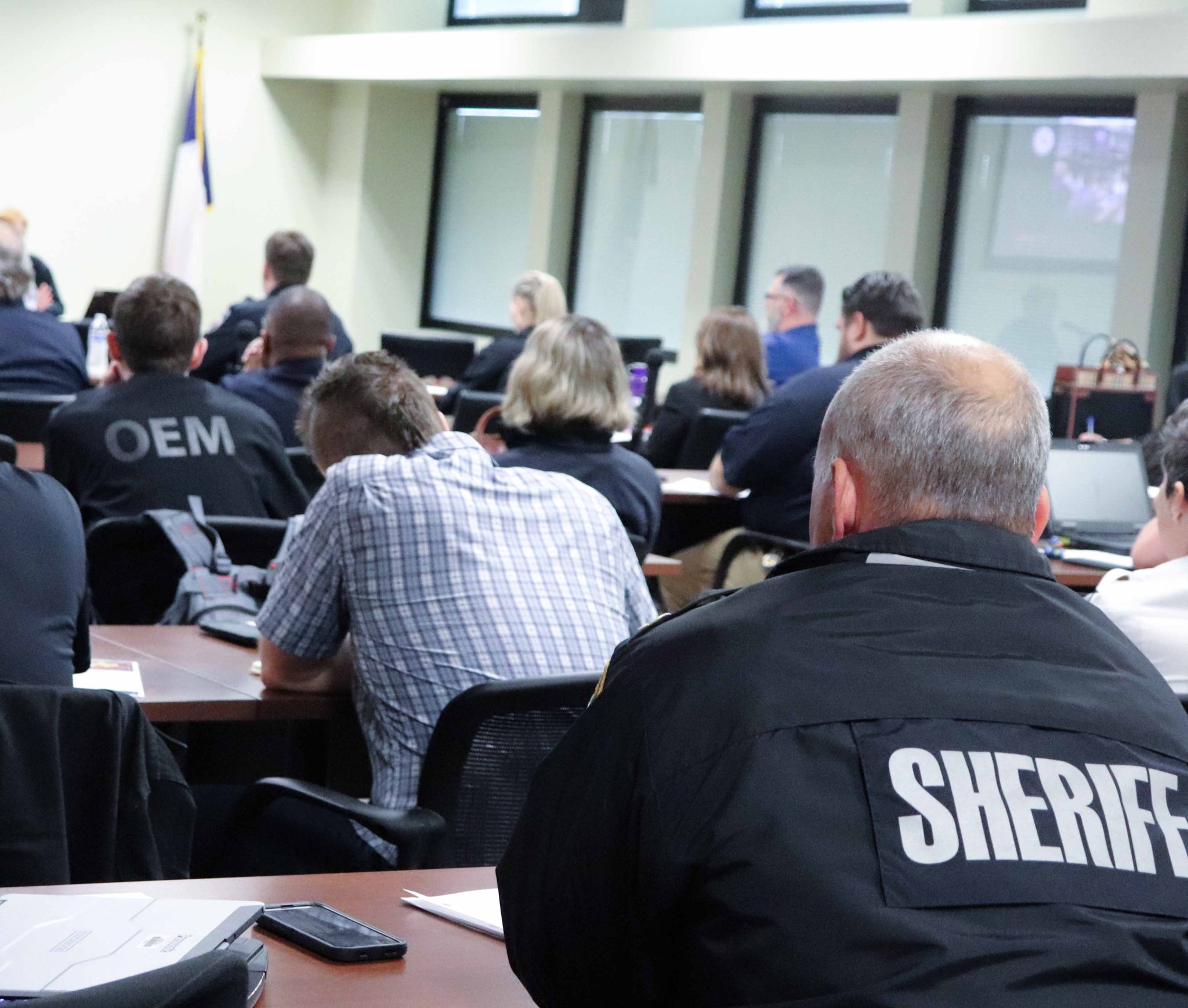
Solar eclipse summit ties state, local plans together
The CAPCOG Homeland Security Division hosted state, regional and local public safety officials to discuss emergency preparedness plans and safety…Feb 27, 2024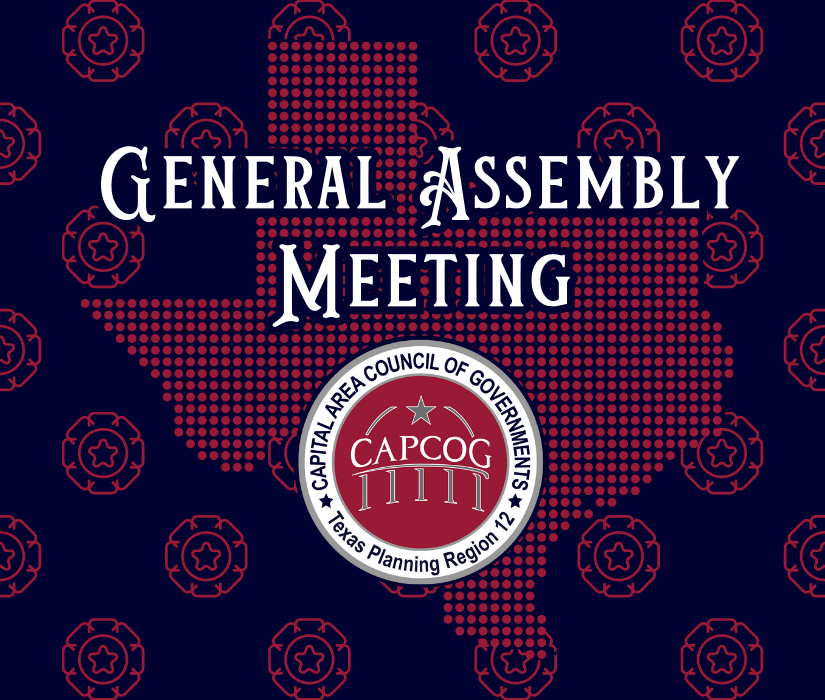
General Assembly to elect Executive Committee
CAPCOG’s General Assembly will meet at 11:30 a.m. Dec. 13, 2023, at the Austin Southpark Hotel, 4140 Governors Row in…Dec 7, 2023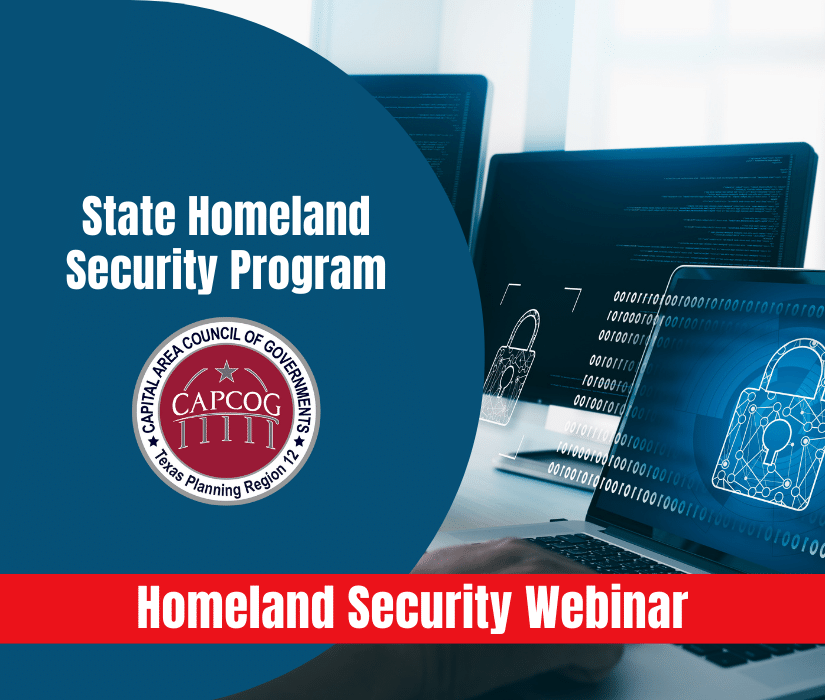
CAPCOG announces Homeland Security grant workshops
CAPCOG will host three virtual State Homeland Security Program Grant workshops in early December for the 2024 funding opportunity. Jurisdictions…Dec 4, 2023
CAPCOG hosts 2024 Solar Eclipse Planning Summit
CAPCOG hosted the 2024 Solar Eclipse Planning Summit in mid-October to focus local eclipse planning efforts on public safety and…Nov 9, 2023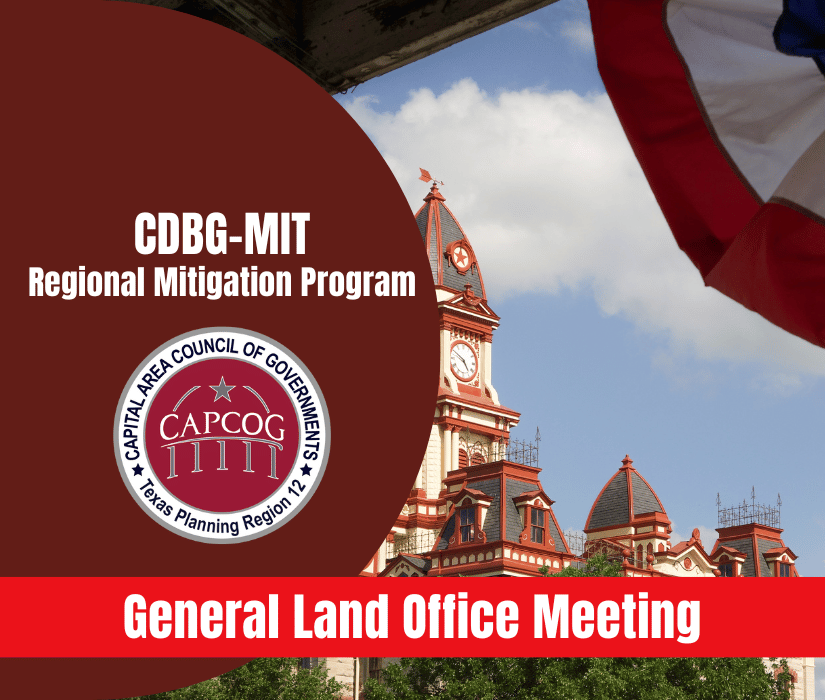
GLO hosts MOD-MIT meeting
The Texas General Land Office will provide a presentation on the CDBG-MIT Regional Mitigation Program and its funding opportunities at…Aug 10, 2023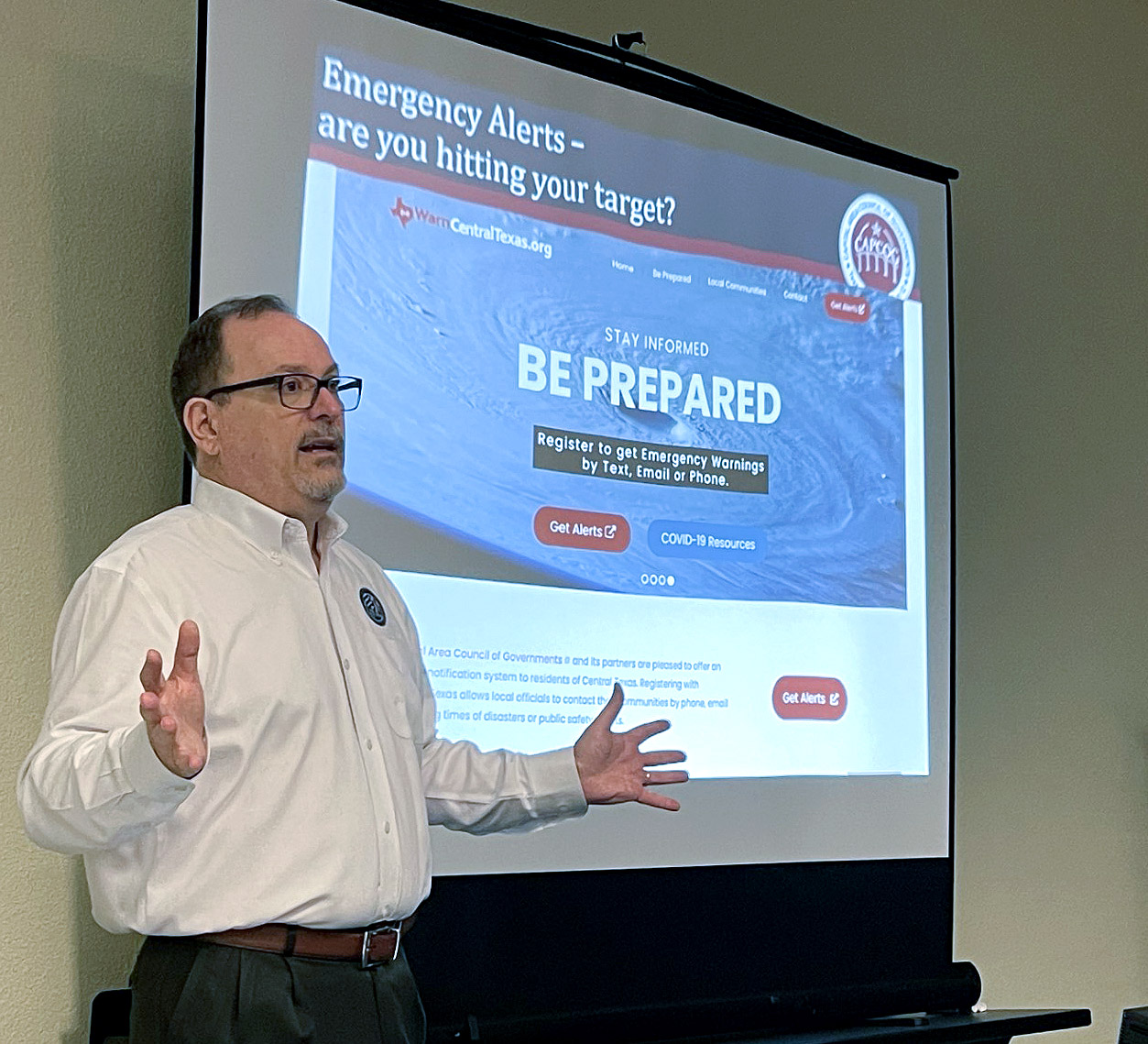
CAPCOG leads emergency alerts talk at state conference
CAPCOG Homeland Security Director, Martin Ritchey, delivered a presentation about best practices for using emergency notification systems, how to overcome…Jul 13, 2023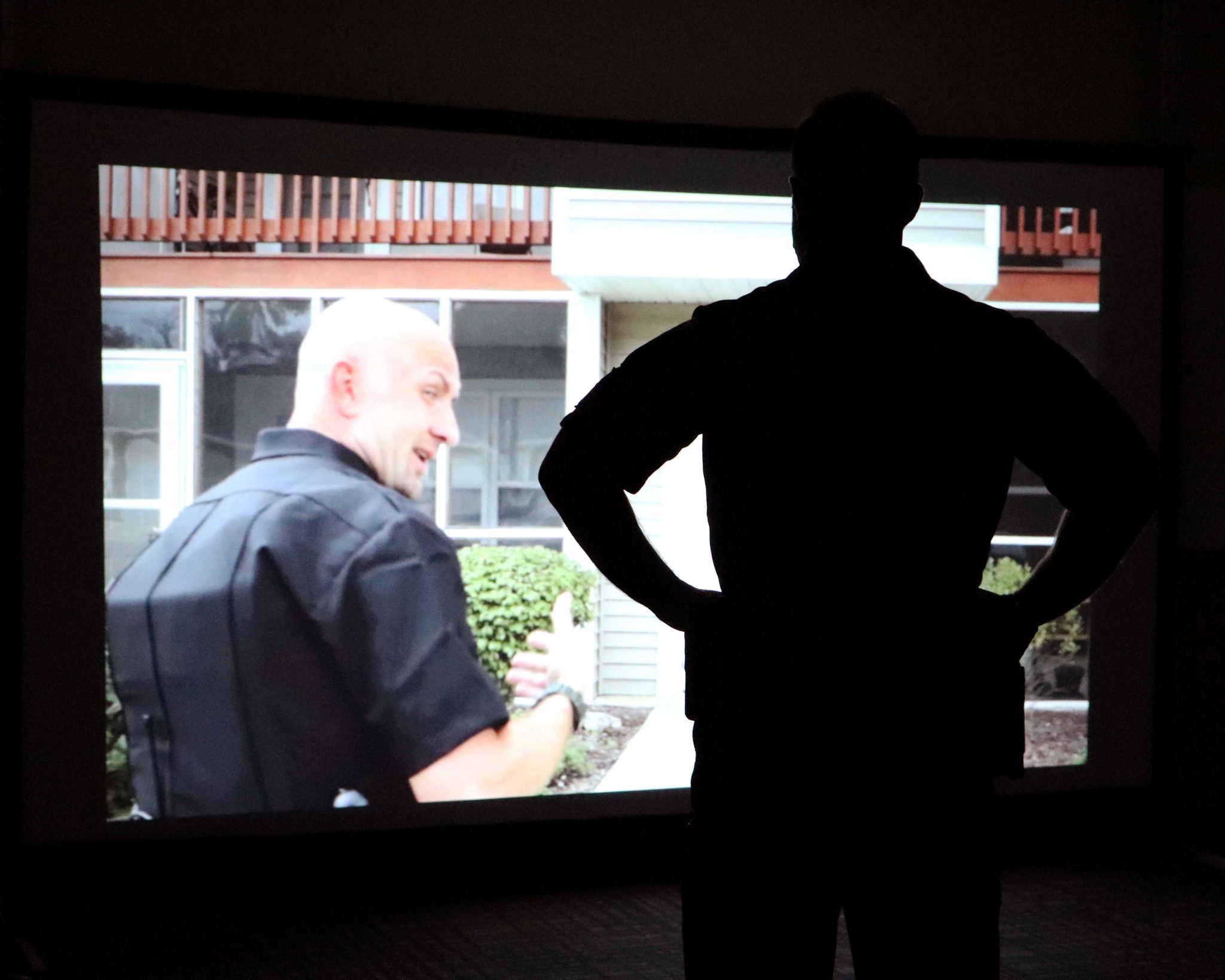
CAPCOG recommends criminal justice grants, OOG to announce in September
CAPCOG recommended 42 criminal justice projects for funding recommending projects beyond the state’s regional budget estimates for the five program…Jun 12, 2023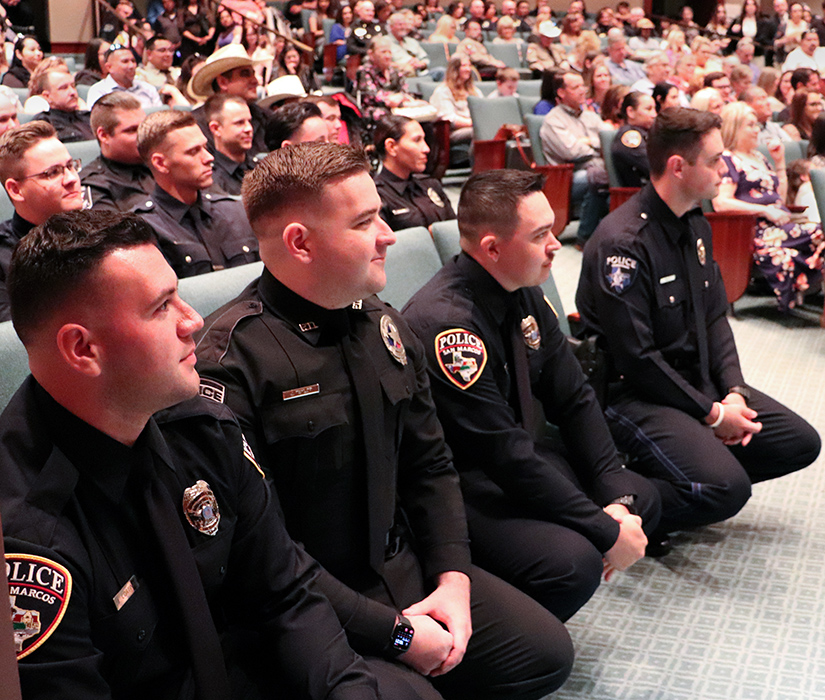
21 become peace officers, graduate from RLEA
The CAPCOG Regional Law Enforcement Academy graduated 21 cadets who all passed their Texas Commission on Law Enforcement Basic Peace…Jun 7, 2023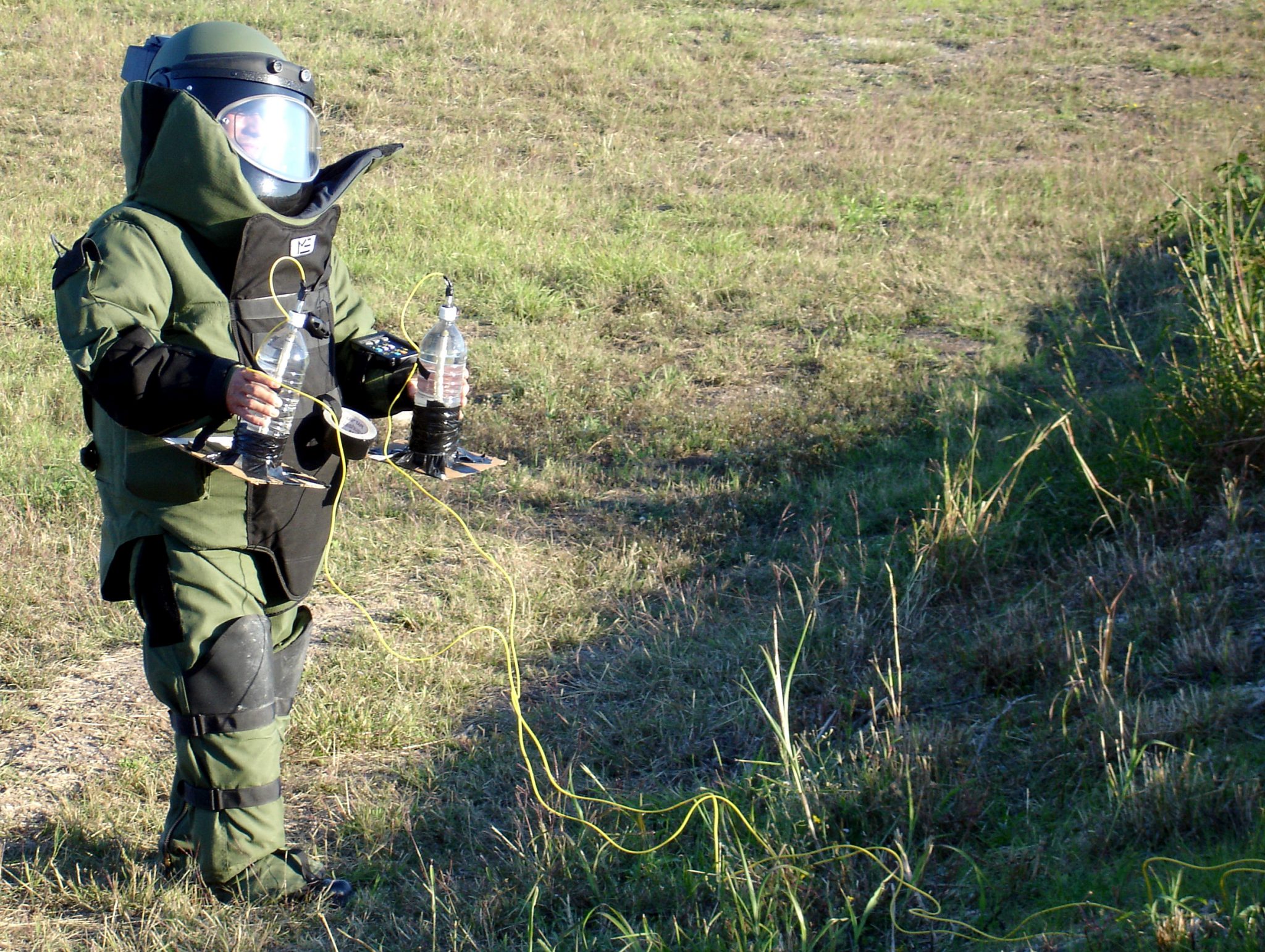
CAPCOG recommends SHSP grant projects to OOG
The CAPCOG Executive Committee reviewed and recommended 22 projects seeking State Homeland Security Program (SHSP) grant funding for the Office…Apr 11, 2023
CAPCOG offers BPOC in Hutto
The CAPCOG Regional Law Enforcement Academy (RLEA) has partnered with the Hutto Police Department to offer an evening basic peace…Apr 4, 2023
April honors emergency telecommunicators, educates about 9-1-1
CAPCOG, in its capacity as the Capital Area Emergency Communications District, will recognize the community service emergency telecommunicators perform for…Apr 3, 2023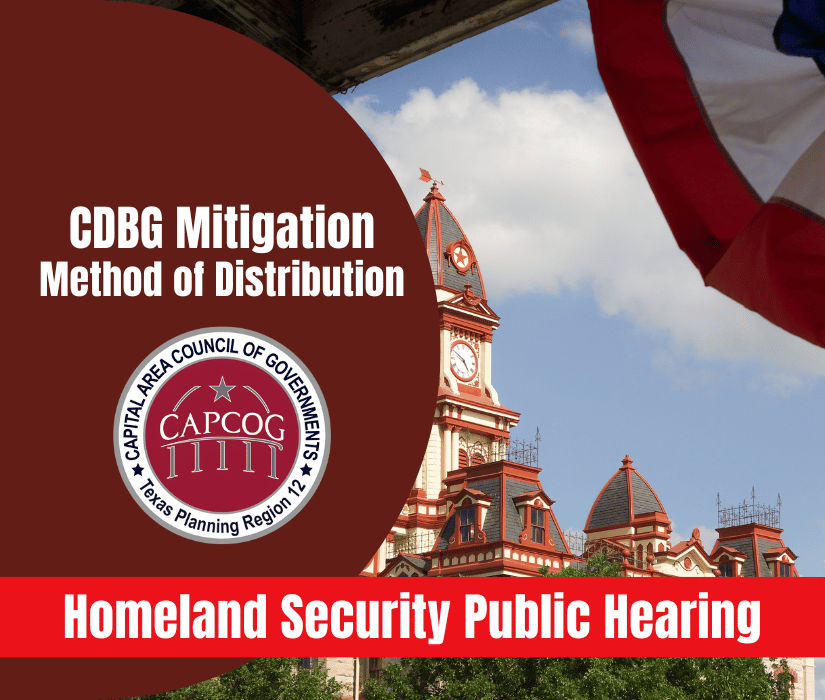
CAPCOG accepts comments on CDBG MIT-MOD
CAPCOG is in the public comment period to finalize use of HUD CDBG Disaster Mitigation funding in partnership with the…Mar 14, 2023
Criminal Justice Program sets grant review meetings
The CAPCOG Criminal Justice Advisory Committee will review 49 grant applications requesting more than $15.9 million from six criminal justice…Mar 14, 2023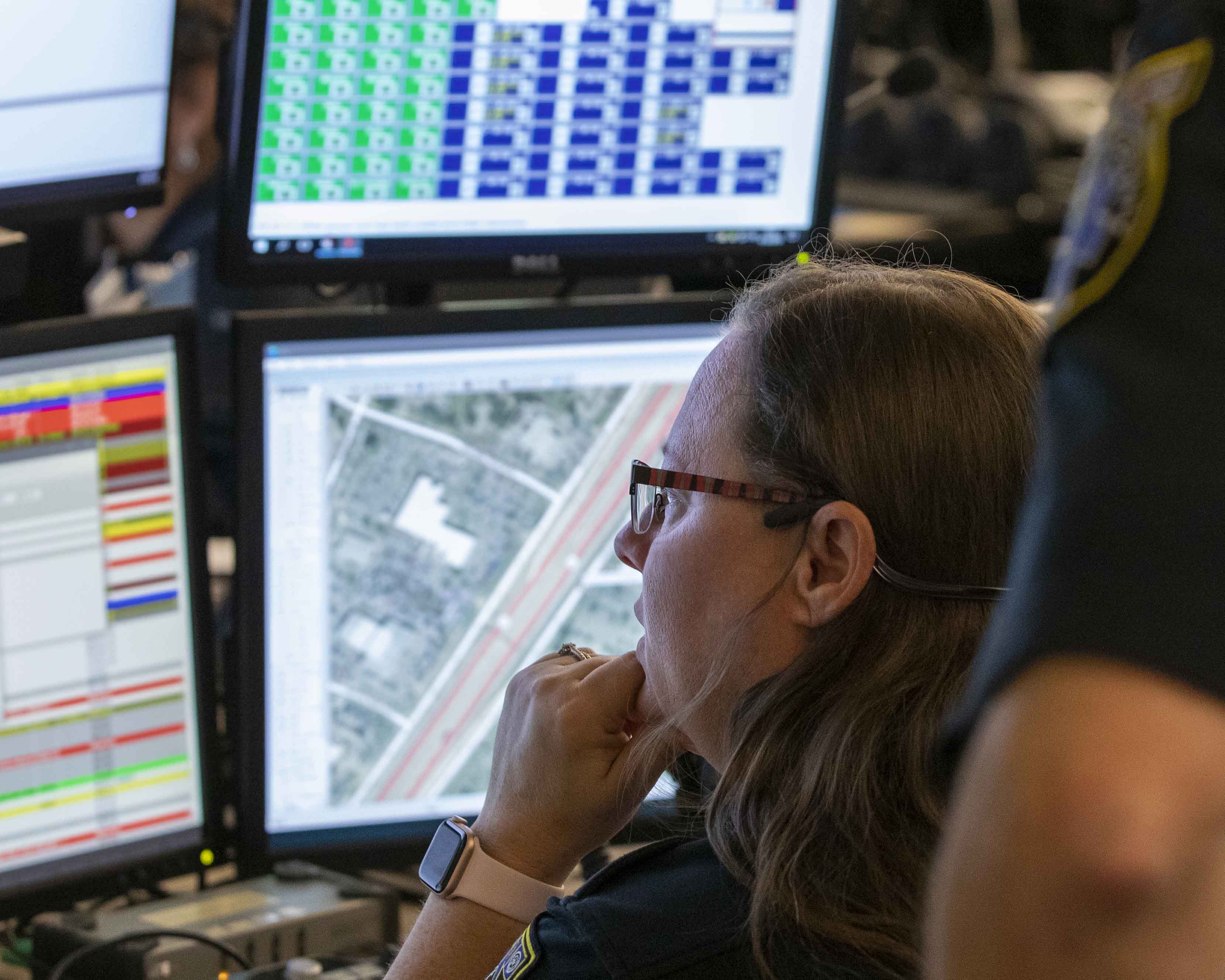
Emergency Communications offers CPR, Criminal Law, more training opportunities
The CAPCOG Emergency Communications Division has scheduled 42 classes for 2023 for telecommunicators to obtain their mandated training as well…Feb 7, 2023
Newly elected Executive Committee votes on officers
CAPCOG’s newly elected Executive Committee held its first 2023 meeting on January 11 when its members elected the board’s officers,…Jan 12, 2023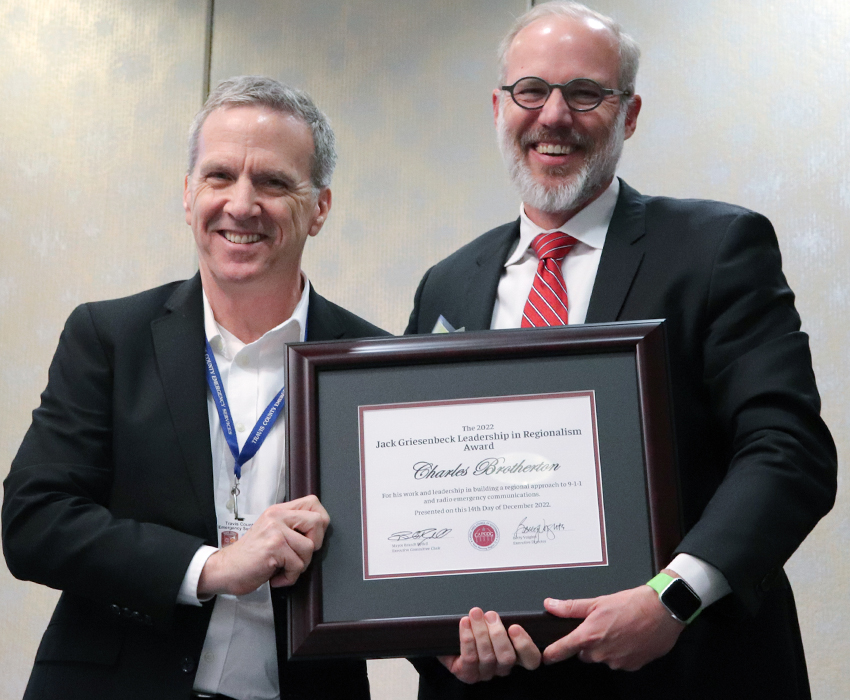
Brotherton earns regionalism award for emergency communications work
CAPCOG presented Charles Brotherton, Travis County executive of emergency services, with its Jack Griesenbeck Leadership in Regionalism Award for his…Jan 10, 2023
New training website makes registering for courses, workshops, events click
CAPCOG has modernized the navigation and added functionality features to an updated training.cacpcog.org to provide more accessible information about upcoming courses, workshops…Dec 20, 2022
OOG releases Public Safety grant announcements
The Office of the Governor’s Public Safety Office released the funding announcements for the five criminal justice funding opportunities and…Dec 14, 2022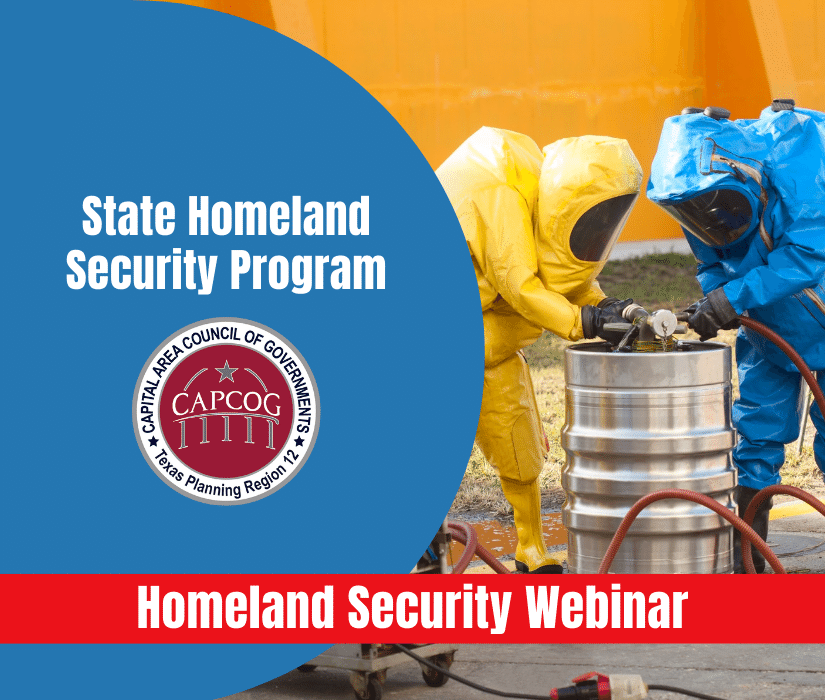
Homeland Security Division schedules mandatory workshops
Local jurisdictions seeking funding from the State Homeland Security Program (SHSP) grant must register for one of the two remaining…Dec 12, 2022
Emergency Communications continues virtual training
The CAPCOG Emergency Communications Division is encouraging more emergency communications centers (ECCs) throughout the region to make use of a…Nov 24, 2022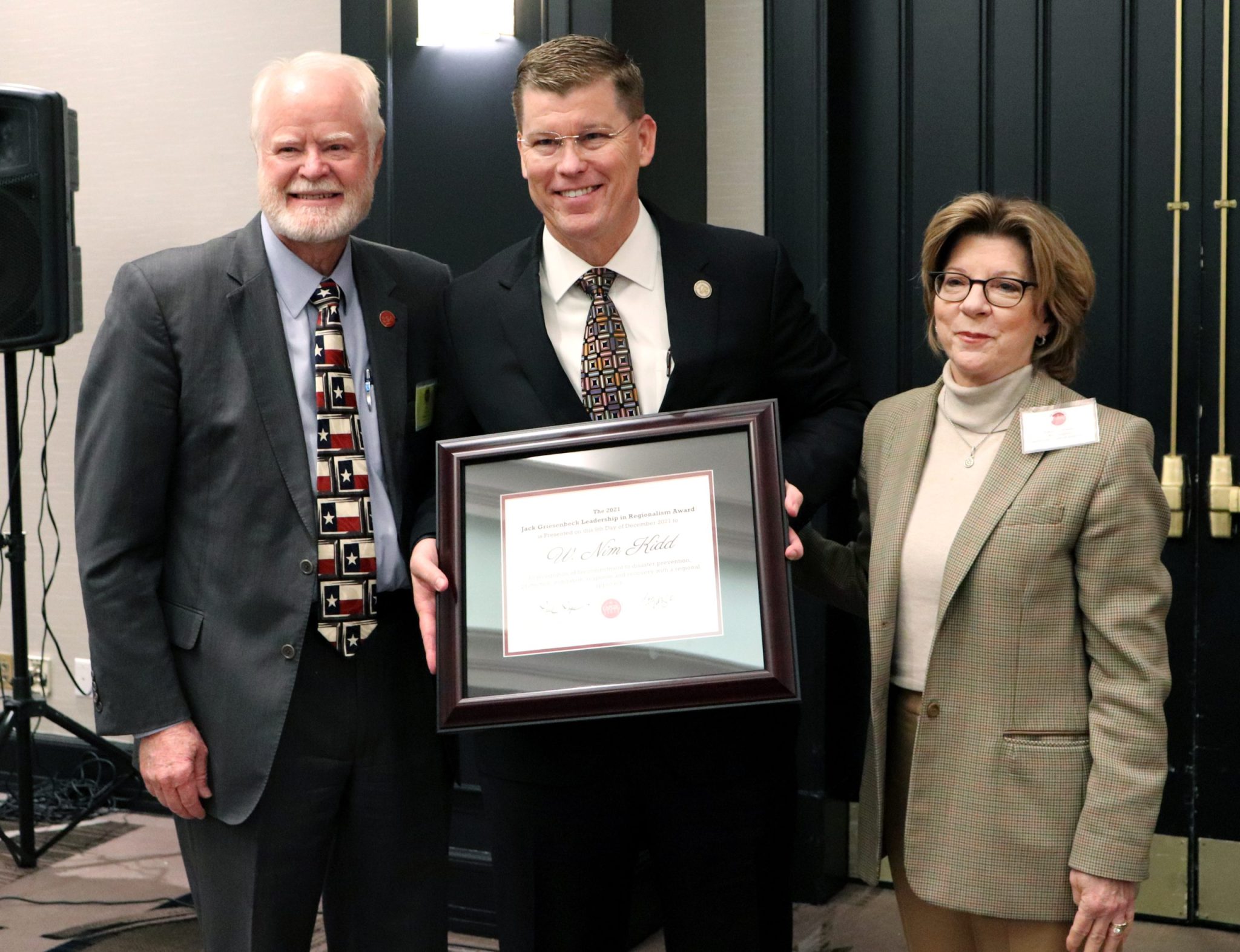
General Assembly to hear from TxDOT, elect 2023 board
CAPCOG General Assembly and the COG’s policy and advisory committee members will hear from Tucker Ferguson, TxDOT district engineer for…Nov 17, 2022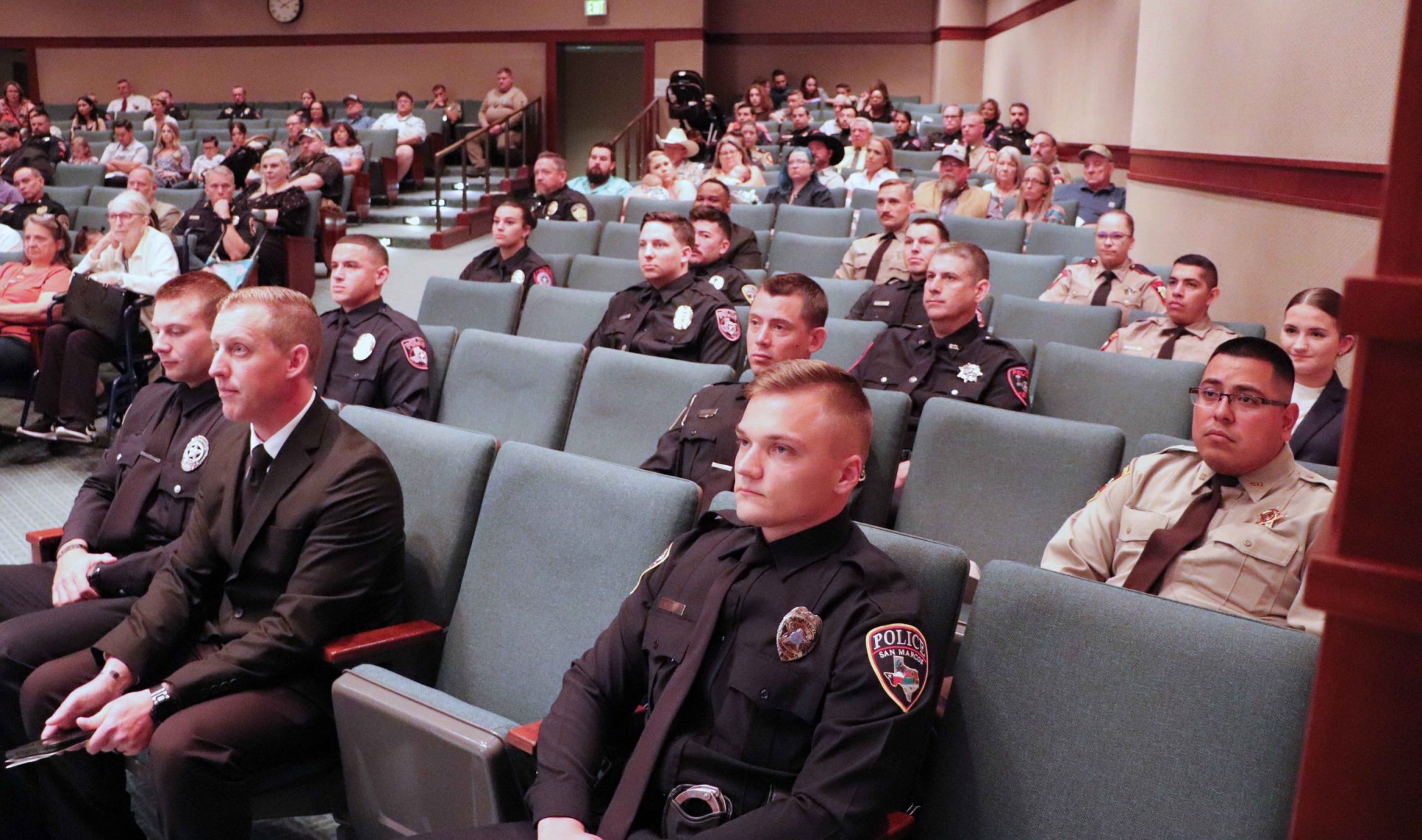
CAPCOG RLEA graduates cadets, kicks off two new BPOCs
The CAPCOG Regional Law Enforcement Academy graduated Basic Peace Office Course (BPOC) No. 96 in early October with 16 cadets…Oct 17, 2022
CAPCOG begins outreach for criminal justice grant season
CAPCOG will kick off the region’s criminal justice grant process with two stakeholder meetings — an in-person meeting at CAPCOG…Sep 22, 2022
Austin Region EDA Director to speak to General Assembly
The Regional Director for the U.S. Economic Development Administration’s (EDA) Austin Regional Office, Jorge Ayala, will address the CAPCOG General…Sep 13, 2022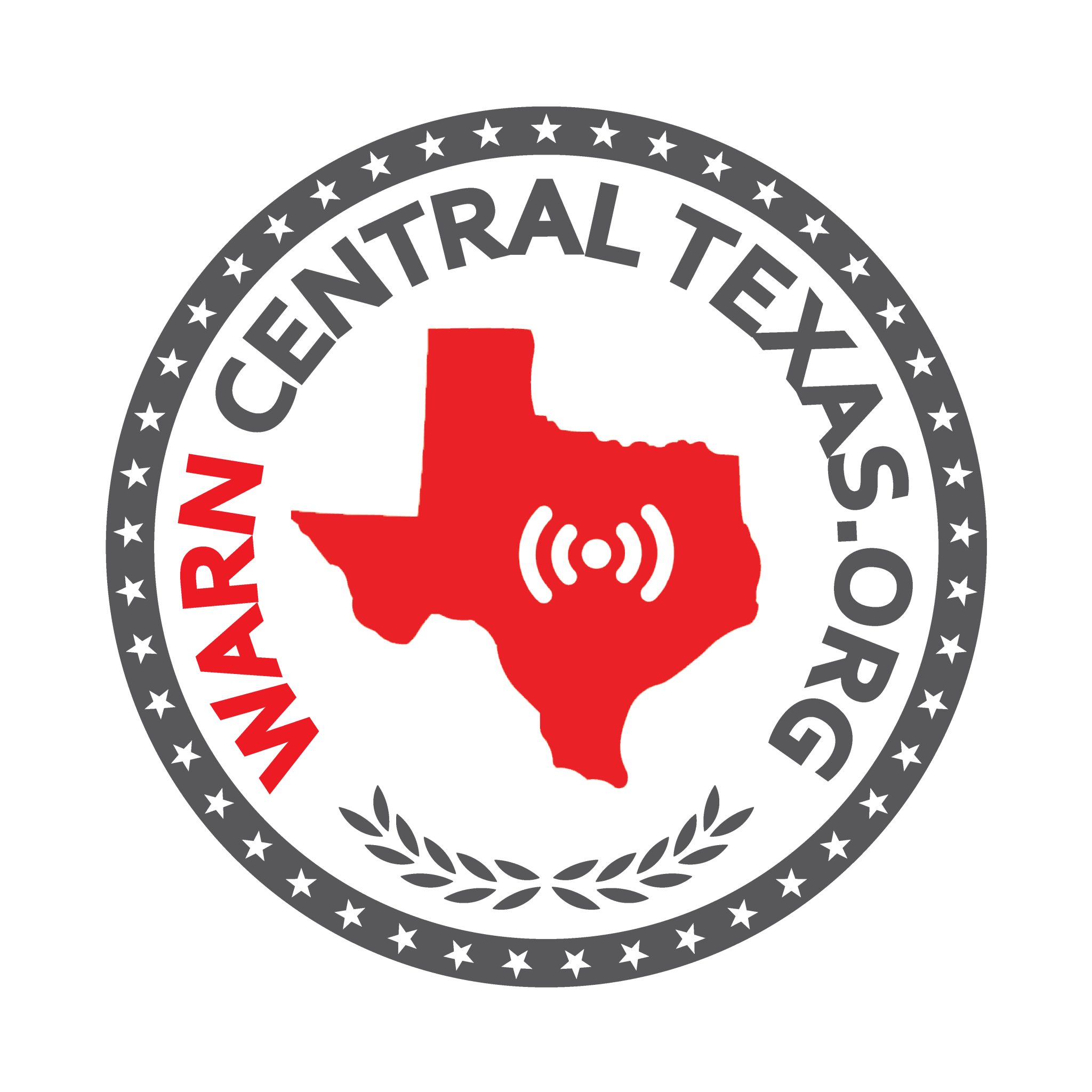
CAPCOG to promote Warn Central Texas, Preparedness Month
The CAPCOG Homeland Security Division released a new Warn Central Texas Frequently Asked Questions (FAQ) document ahead of National Preparedness…Aug 16, 2022
CAPCOG General Assembly to vote on bylaws, 2023 budget
The CAPCOG General Assembly will hold its first meeting of the year at 11:30 a.m., September 14, to consider adopting…Aug 9, 2022
Warn Central Texas earns national recognition award
The National Association of Counties gave Warn Central Texas an Achievement Award in the category of risk and emergency management…Jul 26, 2022
Striking a Balance: Caregiver Conference to be held in person
The Striking a Balance, Family Caregiver Conference is returning to an in-person format to bring national and local caregiving experts,…Jul 19, 2022
CAPCOG aggregates, analyzes Census estimates
Highlights from the CAPCOG’s analysis of the U.S. Census estimates for the 10-county region showed its population grew by 2.33…Jul 14, 2022
RLEA trains law enforcement instructors on self-defense
The CAPCOG Regional Law Enforcement Academy is conducting two certification courses and one recertification course for law enforcement officers seeking…Jun 14, 2022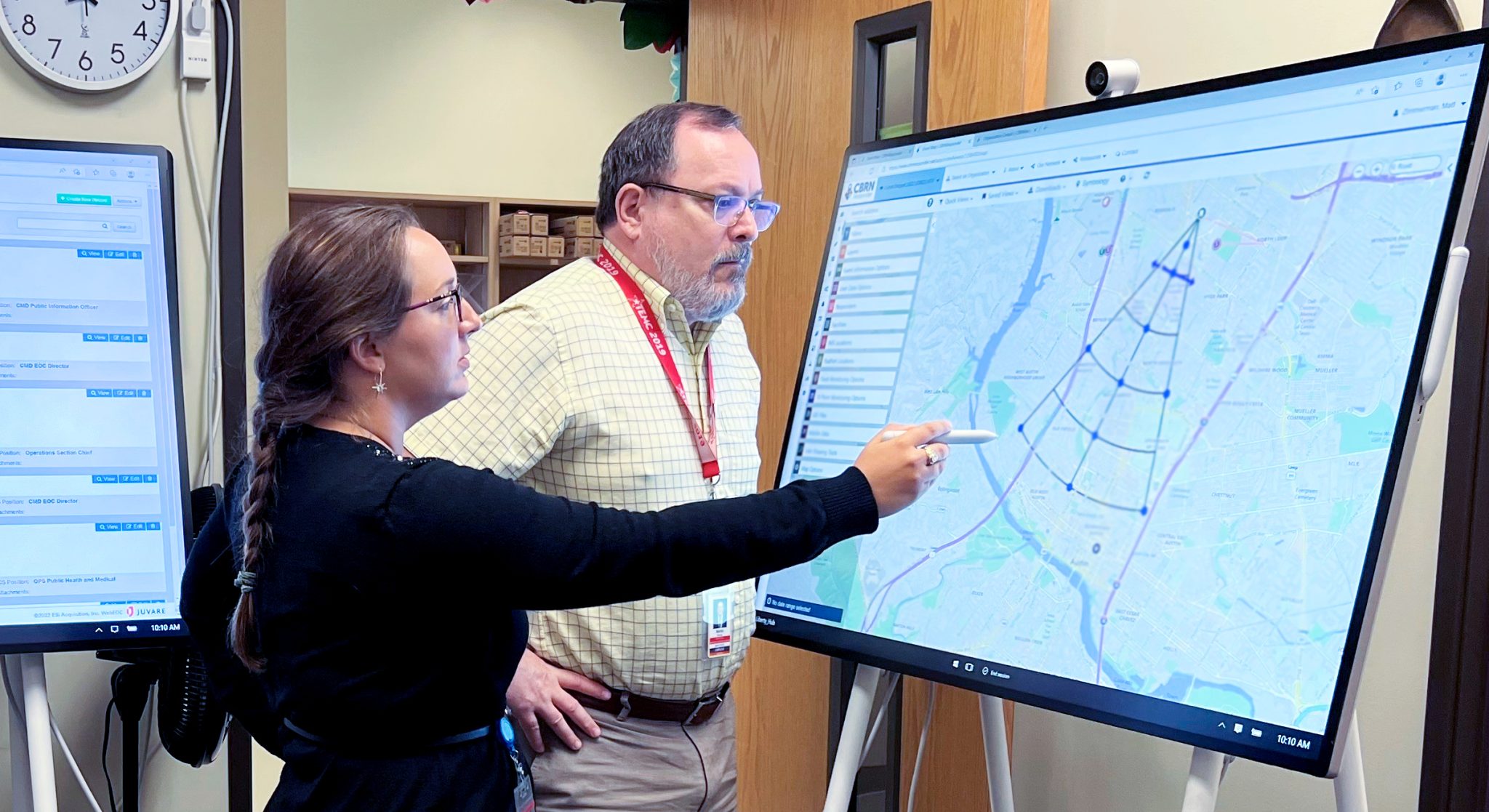
Regional exercise tests national, state, local response
The 2022 CAPCOG homeland security regional exercise had dozens of federal agencies responding with state and local officials to a…Jun 9, 2022
CAPCOG provides stress coping courses for 9-1-1 call takers
CAPCOG’s Emergency Communications Division is hosting two, eight-hour courses in June to help emergency telecommunicators better manage job stress and…Jun 7, 2022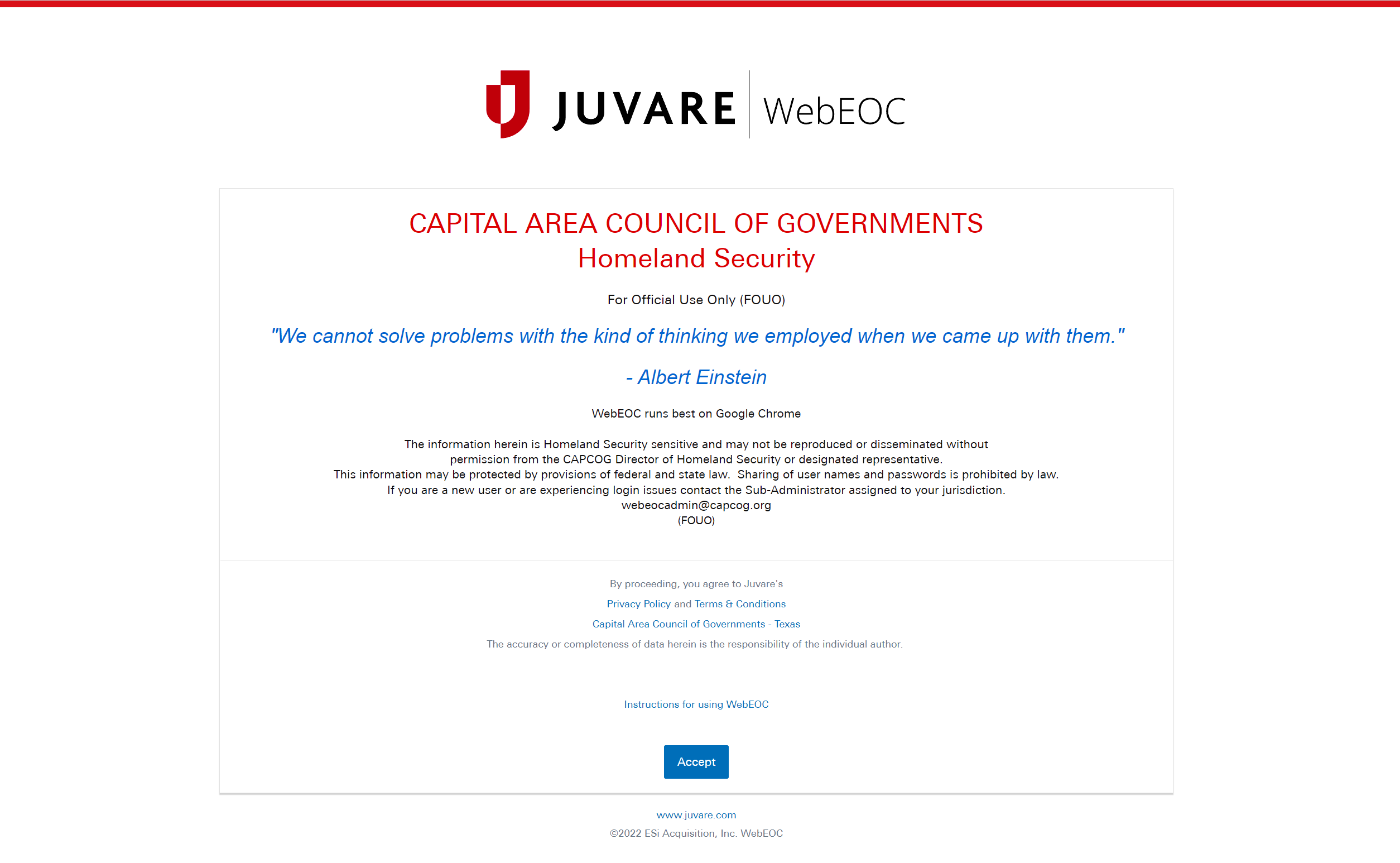
CAPCOG’s Homeland Security Division strengthens WebEOC for the region
The CAPCOG Homeland Security Division has enhanced WebEOC’s, an online crisis information and communication system, features to improve emergency response…May 24, 2022
CAPCOG recommends criminal justice grant projects to OOG
The CAPCOG Executive Committee recommended a prioritized list of project applications seeking state criminal justice grant funding to the Office…May 19, 2022
Texas NENA elects CAPCOG’s Pamela Frisk Vice President
Members of the Texas National Emergency Number Association (NENA) during the Texas Public Safety Conference in April nominated and elected…May 17, 2022
Public hearings kickoff Hurricane Harvey MOD process
The CAPCOG Homeland Security Division is developing a Method of Distribution (MOD) for Community Development Block Grant (CDBG) – Mitigation…May 9, 2022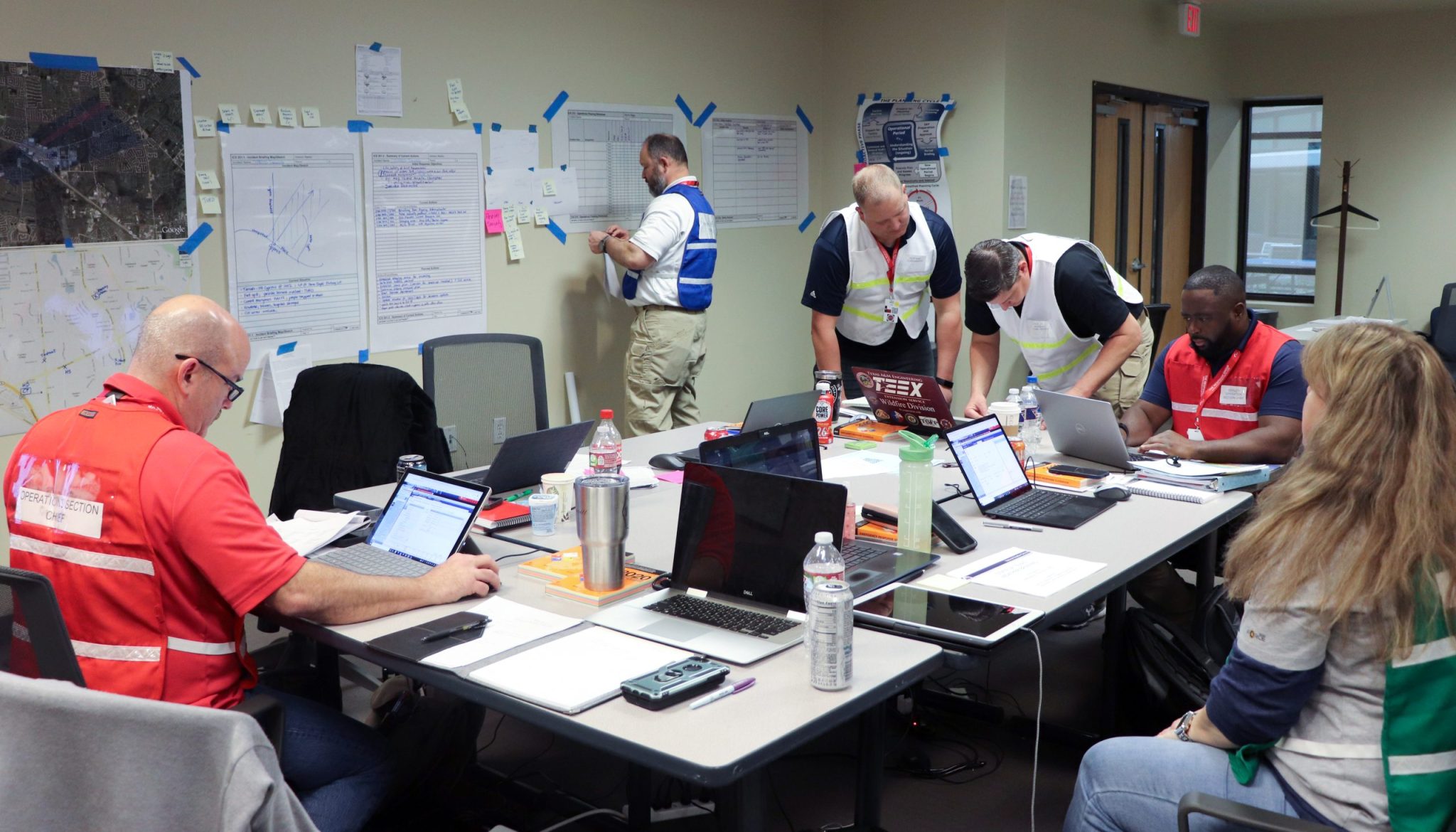
Homeland Security Division ramps up regional emergency management training
CAPCOG’s Homeland Security Division has scheduled six training courses for emergency management and other public safety stakeholders between April and…Apr 15, 2022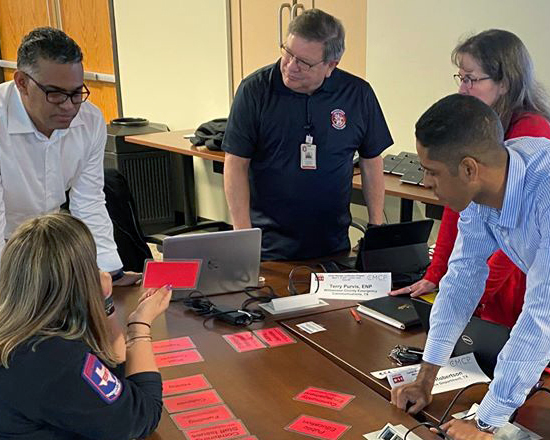
Emergency Communications conducts 12-month training
The Emergency Communications Division is conducting a longer-term leadership course for emergency call center (ECC) supervisors, trainers, and managers that addresses…Apr 13, 2022
CAPCOG adds deputy executive director bringing 10 years’ government experience
Anwar Sophy joined CAPCOG as its deputy executive director in late February bringing 10 years of state and local government,…Mar 17, 2022
CAPCOG to recognize emergency telecommunicators in April
CAPCOG, in its capacity as the Capital Area Emergency Telecommunications District, will honor the region’s more than 800 emergency telecommunicators…Mar 15, 2022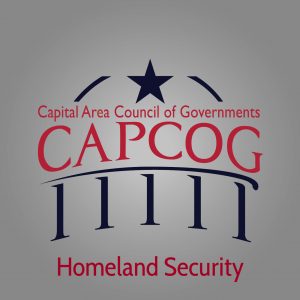
CAPCOG homeland security director joins EMAT board
Emergency Management Association of Texas (EMAT) members elected Martin Ritchey, CAPCOG’s homeland security director, to serve as the association’s treasurer…Mar 10, 2022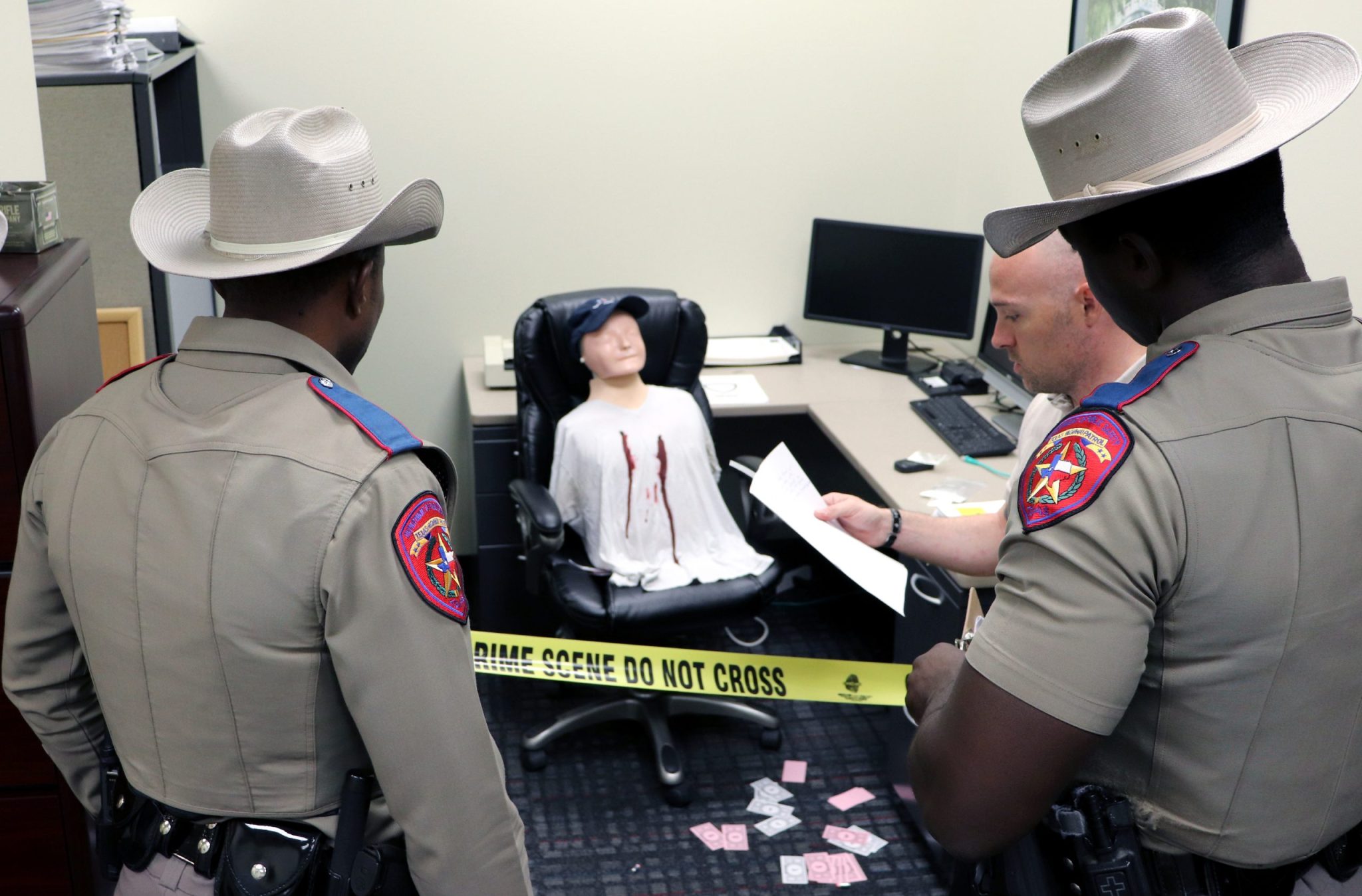
Regional Law Enforcement Academy ramps up training early in training cycle
More training is being scheduled at locations around the region to ensure officers can access training they need and local…Dec 16, 2021
CAPCOG schedules four criminal justice grant workshops
CAPCOG’s Criminal Justice Program has scheduled four grant writing workshops to take place around the region: Dec. 17, 2021 at…Dec 14, 2021
Mandatory workshops set for state homeland security grants
Three State Homeland Security Program (SHSP) grant workshops are scheduled to take place online from 1:30 to 4 p.m. on…Dec 7, 2021
Census releases 2020 count, CAPCOG aggregates data
The CAPCOG region grew by more than a half million people between 2010 and 2020 according to the 2020 Census…Sep 9, 2021
General Assembly to get transportation, census update
The CAPCOG General Assembly at its September meeting will hear a regional transportation update from Tucker Ferguson, Texas Department of…Sep 7, 2021
Census Bureau releases CAPCOG 2020 numbers
CAPCOG compiled population numbers from the 2020 Census at the county and regional level after the U.S. Census Bureau released…Aug 13, 2021
GLO grants CAPCOG area governments Harvey recovery funds
The CAPCOG Homeland Security division assisted the Texas General Land Office (GLO) in promoting a funding opportunity that awarded $70.53…Jun 24, 2021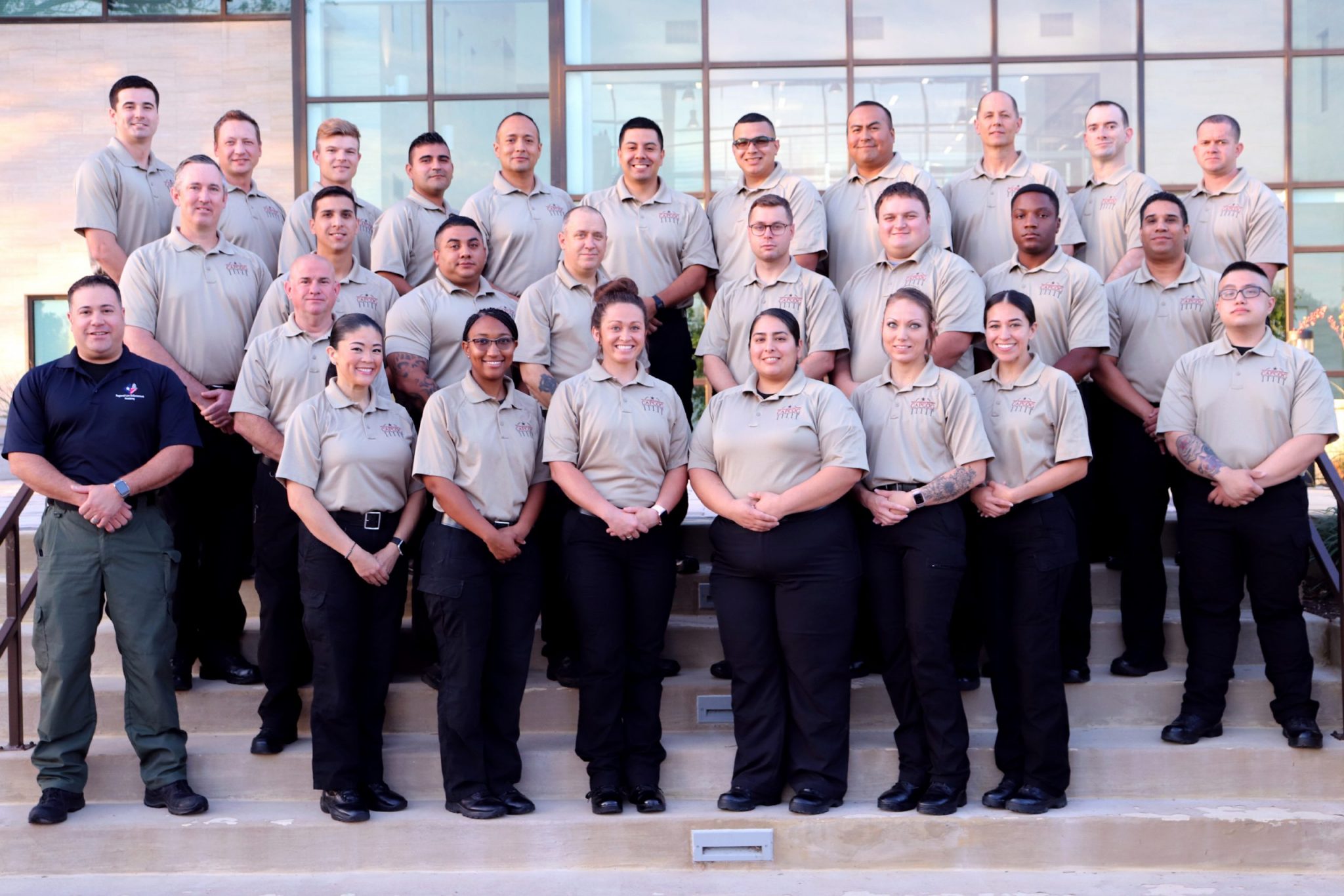
RLEA graduates 27 peace officer cadets, more expected in July
Twenty-seven peace officer cadets graduated from the CAPCOG Regional Law Enforcement Academy’s (RLEA) Basic Peace Officer Course No. 92 after…Jun 22, 2021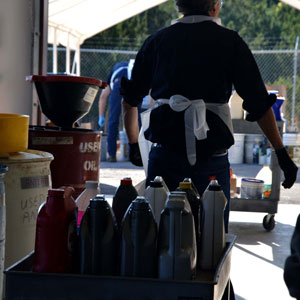
Solid Waste Program hosts hazardous waste training
CAPCOG’s Solid Waste program will host a 40-hour Hazardous Waste Operations and Emergency Response training from July 12 to 16…Jun 17, 2021
Executive Committee forwards justice grant priorities to OOG
The CAPCOG Executive Committee voted at its regular May and April meetings to recommend to the Office of the Governor…Jun 15, 2021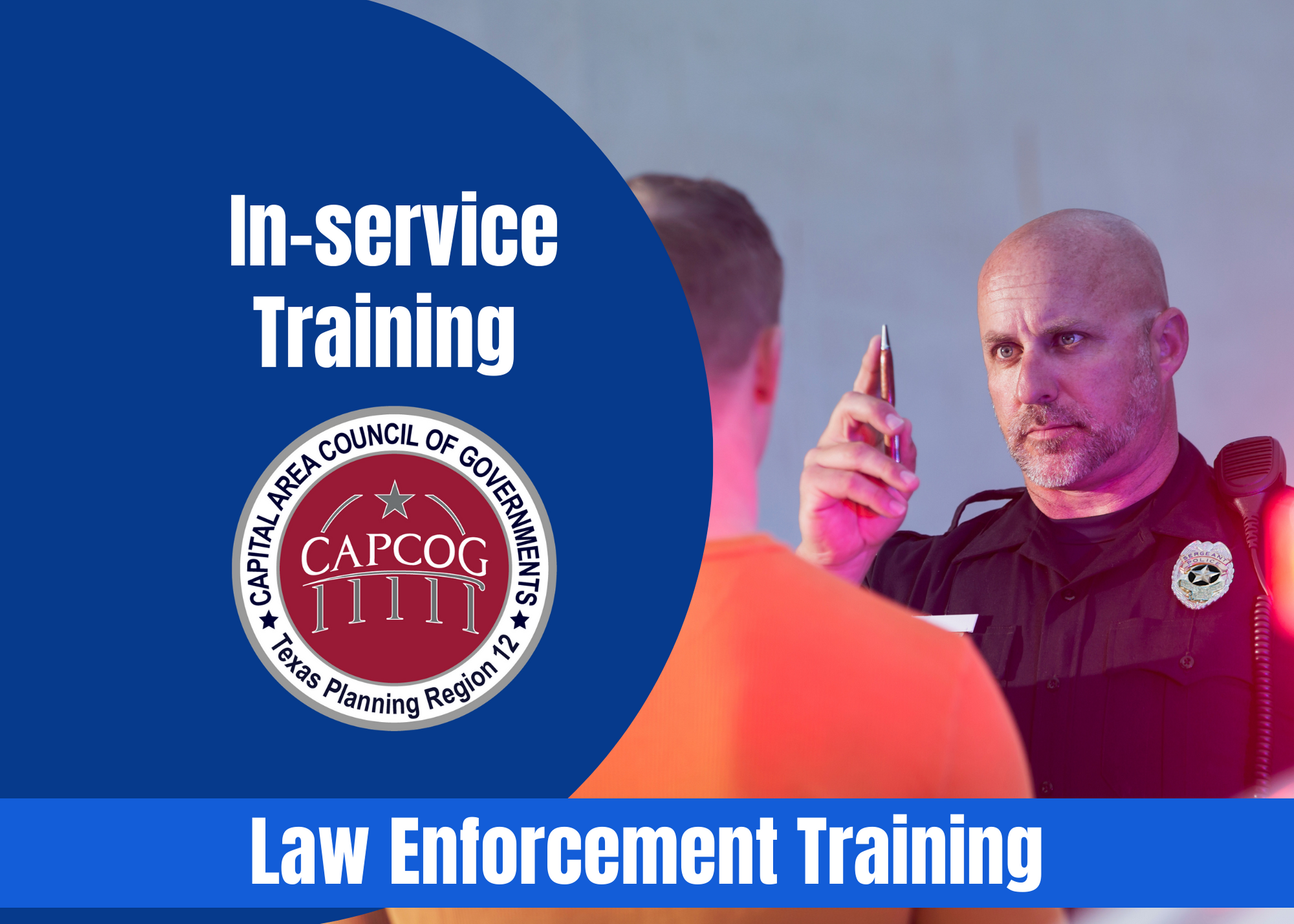
RLEA offers Standard Field Sobriety Test Practitioner training
The CAPCOG Regional Law Enforcement Academy (RLEA) is offering a 24-hour, mandated Standard Field Sobriety Test Practitioner training which teaches…Jun 8, 2021
GLO announces $70 mil to CAPCOG region
The Texas General Land Office (GLO) announced today that seven local governments in the Capital Area Council of Governments (CAPCOG)…May 21, 2021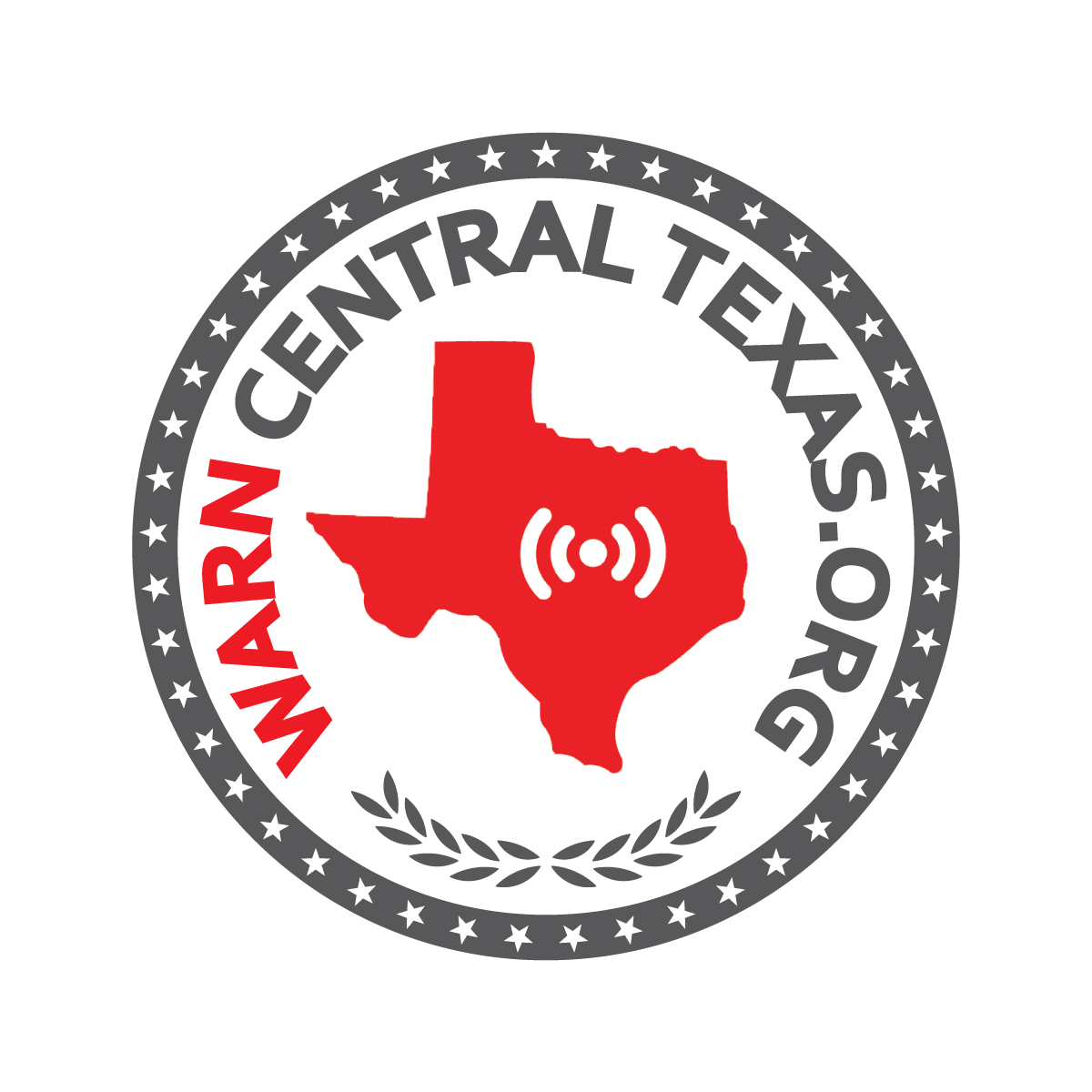
CAPCOG recognizes Hurricane Preparedness Week
Hurricanes can impact large areas beyond the coastal regions, and the CAPCOG 10-county region is no exception to these storm’s…May 10, 2021
CAPCOG makes homeland security grant funding recommendations
The CAPCOG Executive Committee prioritized 31 projects for the State Homeland Security Program grants; recommending 15 projects for funding based…Apr 29, 2021
Telecommunicators week honors dedicated service
The past year resulted in many challenging circumstances for emergency telecommunicators from the COVID-19 pandemic to the February winter storm…Apr 12, 2021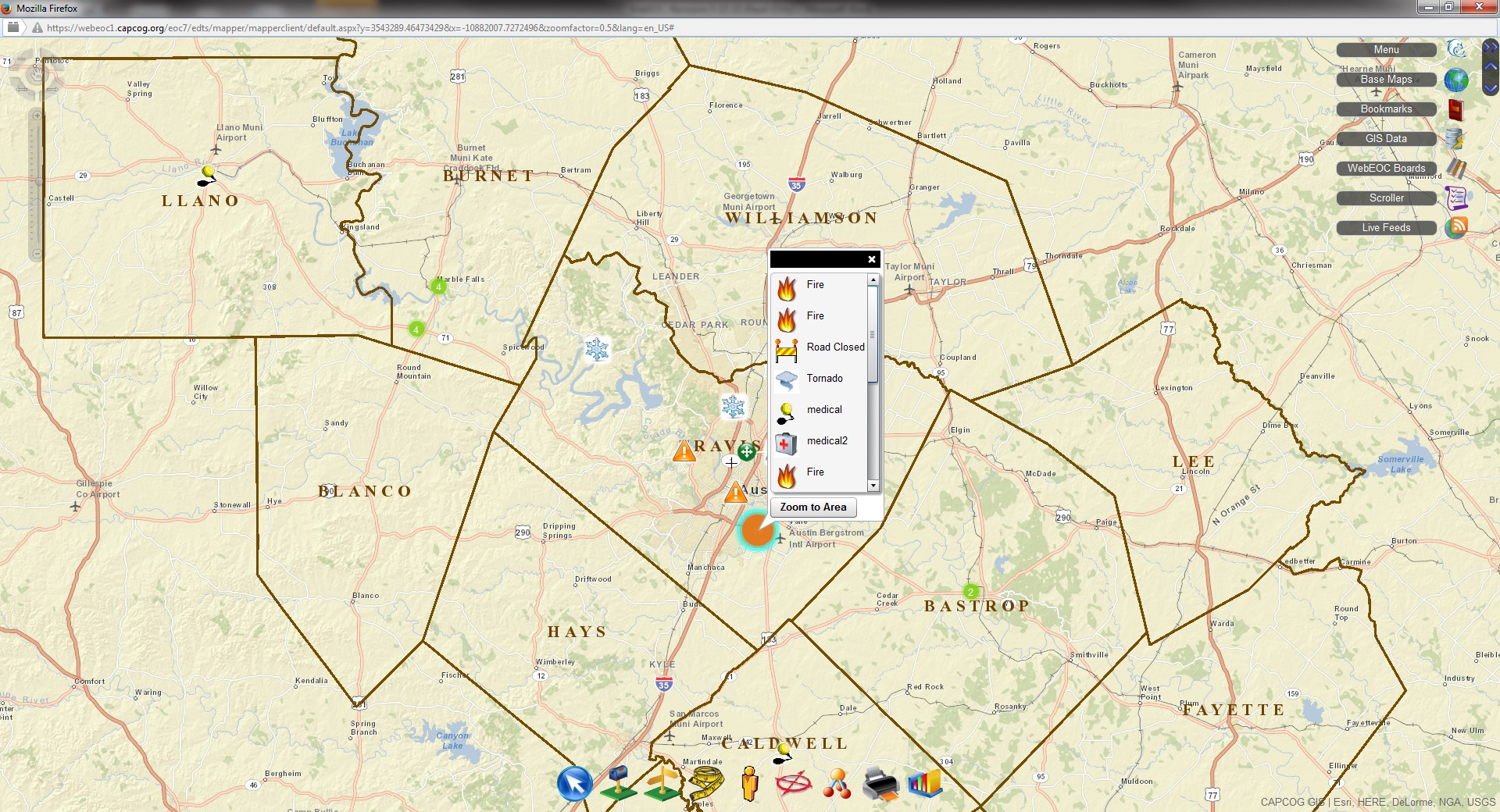
WebEOC assists with regionwide emergency response
Emergency Management Coordinators (EMCs) and other public safety officials used CAPCOG’s digital regional planning coordination tool, WebEOC, to share critical…Mar 23, 2021
WarnCentralTexas.org alerts many during winter storm
CAPCOG’s regional notifications system, WarnCentralTexas, alerted more residents than ever during Winter Storm Uri, which struck the entire state from…Mar 16, 2021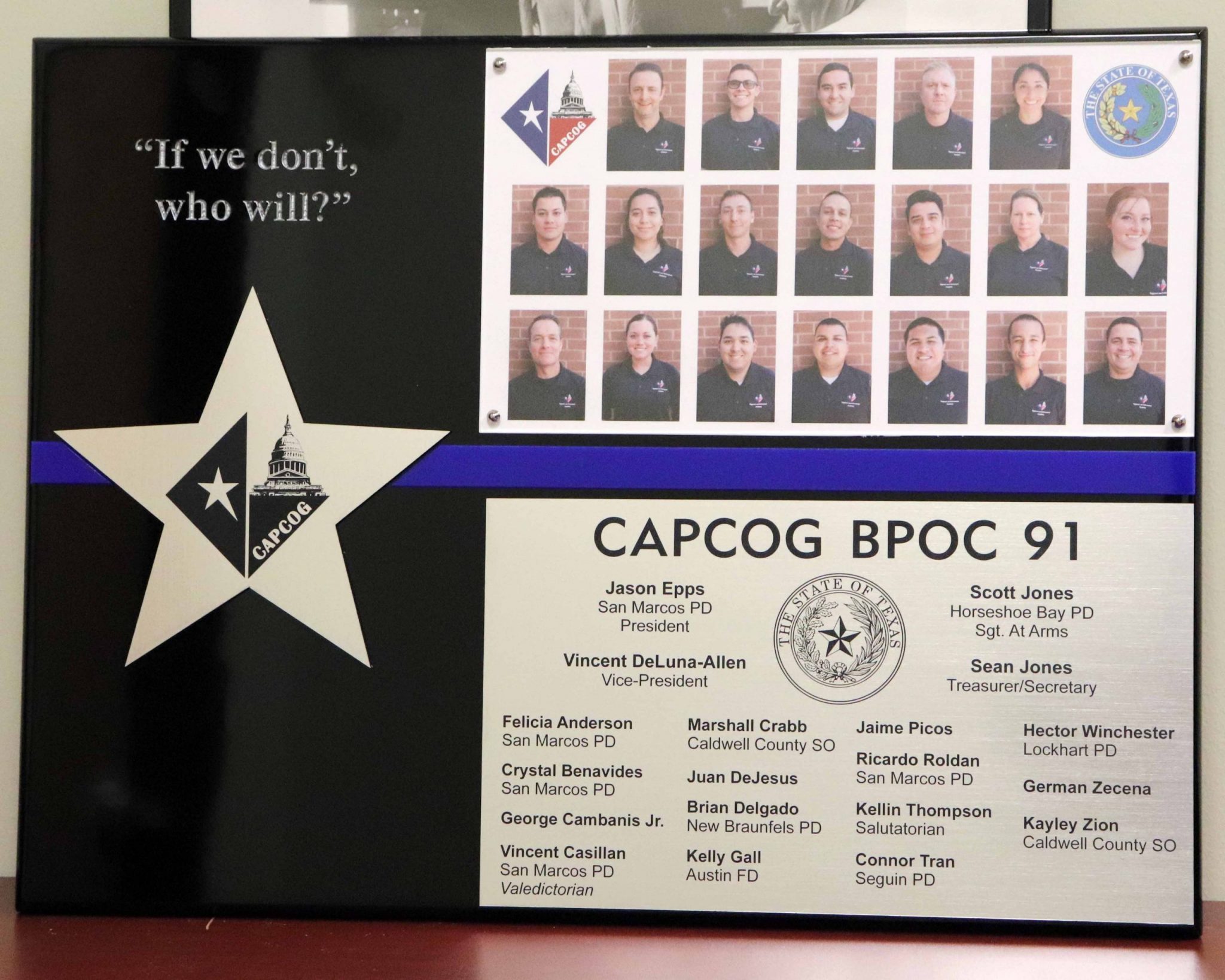
19 cadets graduate, 35 start basic peace officer course
The CAPCOG Regional Law Enforcement Academy (RLEA) graduated Class No. 91 in January with 19 cadets earning their basic peace…Feb 18, 2021
General Assembly to elect two Executive Committee members
CAPCOG will hold a special called General Assembly meeting at 11 a.m. February 10 to elect two officials to Executive…Feb 8, 2021
Executive Committee members to elect new officers at meeting
The CAPCOG Executive Committee will meet virtually for its first meeting of 2021 on January 13, when its members will…Jan 11, 2021
CAPCOG offers 9-1-1 telecommunicators pandemic training
CAPCOG’s Emergency Communications Division conducted its first pandemic specific course for emergency telecommunicators in early December and a second will…Dec 17, 2020
CAPCOG General Assembly to vote on Executive Committee
The CAPCOG General Assembly will elect the 2021 Executive Committee at its annual membership meeting on Dec. 9, 2020 based…Dec 7, 2020
PSAP network upgrades move region closer to NextGen 9-1-1 implementation
CAPCOG, acting in its capacity of the Capital Area Emergency Communications District, started making hardware, software and cabling upgrades to…Nov 19, 2020
CAPCOG revamps regional homeland security plans
The CAPCOG Homeland Security Division is completing an update to the region’s Threat and Hazard Identification and Risk Assessment along…Nov 17, 2020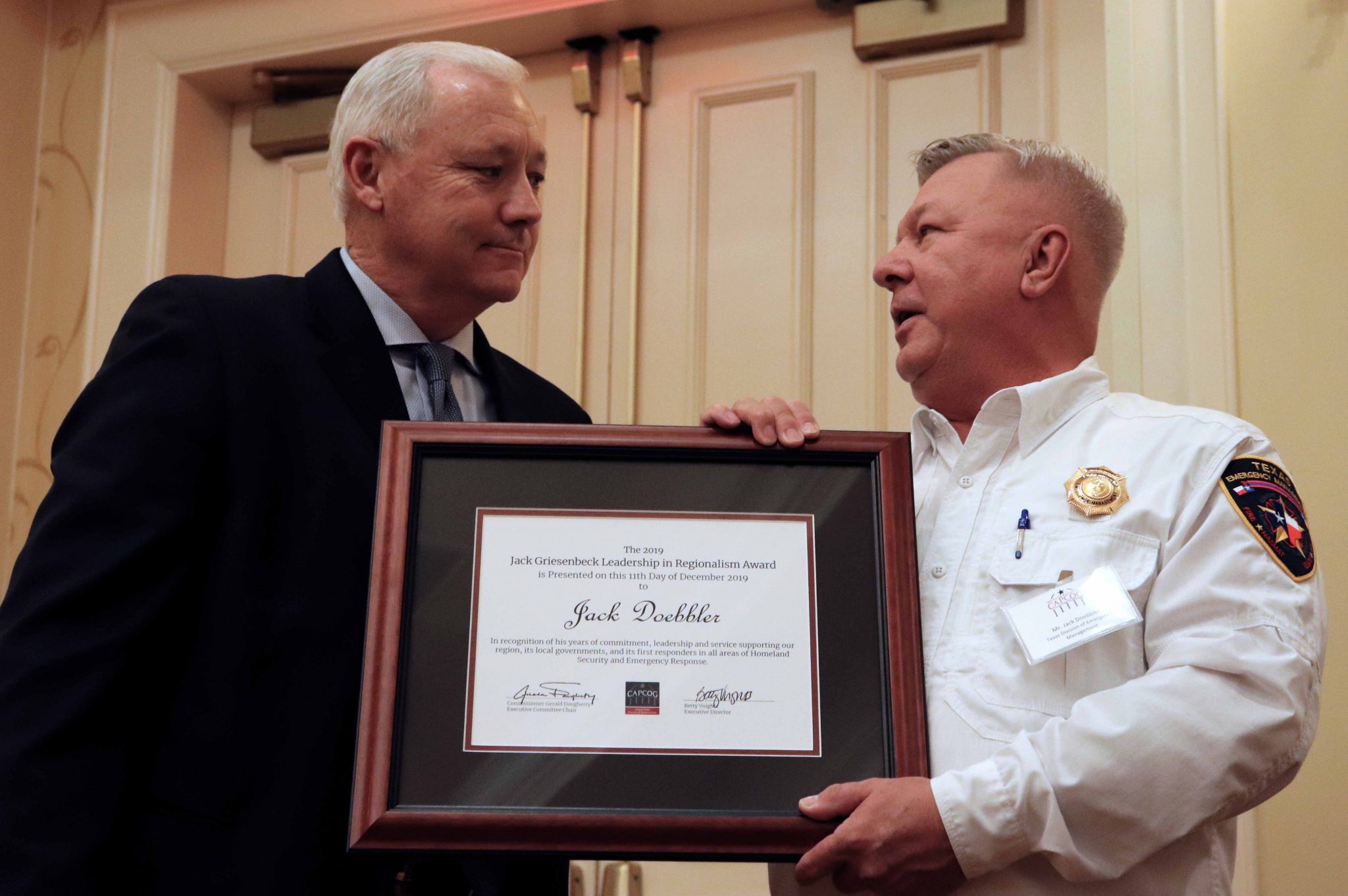
CAPCOG General Assembly to elect 2021 Executive Committee
CAPCOG General Assembly representatives will elect the agency’s 2021 Executive Committee during its 11 a.m., December 9 meeting, which will…Nov 12, 2020
CAPCOG solicits Executive Committee nominations
CAPCOG is seeking nominations from General Assembly Representatives interested in serving on the 2021 Executive Committee, which meets the second…Sep 9, 2020
CAPCOG still interested in coordinating shared services
CAPCOG sent out a survey in late January to determine if the region’s local governments would be interested in sharing…Aug 11, 2020
CAPCOG's COVID-19 response, operations
The CAPCOG offices are currently closed to visitors because of the COVID-19 pandemic; however, all of CAPCOG's divisions are still…Jun 5, 2020
CAPCOG encourages local governments to apply for CESF
The Office of the Governor’s Public Safety Office allocated about $2.8 million to the CAPCOG region from its Coronavirus Emergency…Jun 5, 2020
CAPCOG supplies regional COVID-19 response, impact info
The information important to the region’s emergency managers related to the Coronavirus pandemic includes confirmed cases, deaths attributed to the…May 21, 2020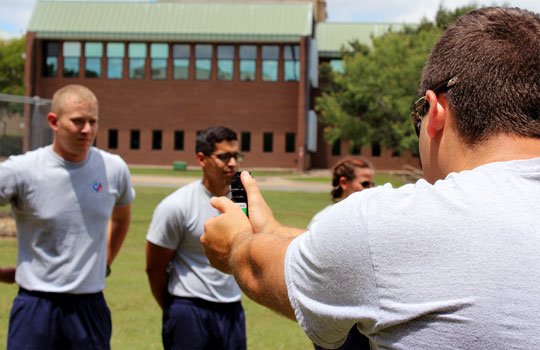
CAPCOG RLEA graduates 19 cadets
The CAPCOG Regional Law Enforcement Academy graduated 19 cadets from its Basic Peace Officer Course (BPOC) No. 90 on May…May 12, 2020
OOG announces COVID-19 Emergency Supplemental Funding
The Office of the Governor, Public Safety Office, Criminal Justice Division, announced the Coronavirus Emergency Supplemental Funding Program allocating about…Apr 17, 2020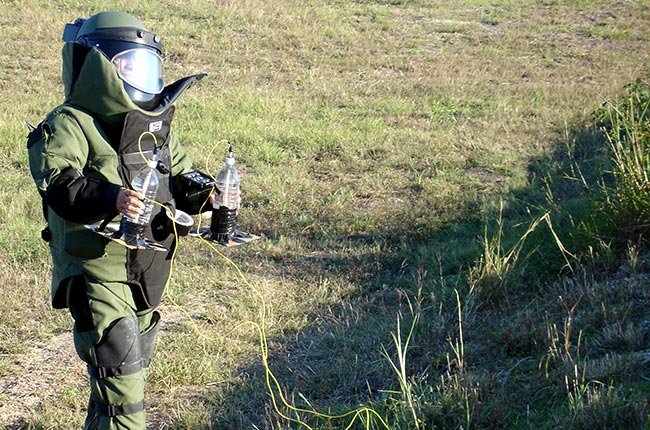
Executive Committee sends SHSP grants to governors’ office
The CAPCOG Executive Committee at its March meeting approved a prioritized list of 30 Homeland Security projects, 13 of which…Apr 16, 2020
CAPCOG responds to COVID-19 helping EMCs, older adults
CAPCOG is assisting local jurisdictions with emergency management response efforts to the COVID-19 pandemic and addressing older adult nutrition and…Apr 9, 2020
Criminal justice grant meetings set for video conference
The CAPCOG Criminal Justice Advisory Committee (CJAC) will conduct its grant scoring meetings on April 14, 15, 16, online instead…Apr 6, 2020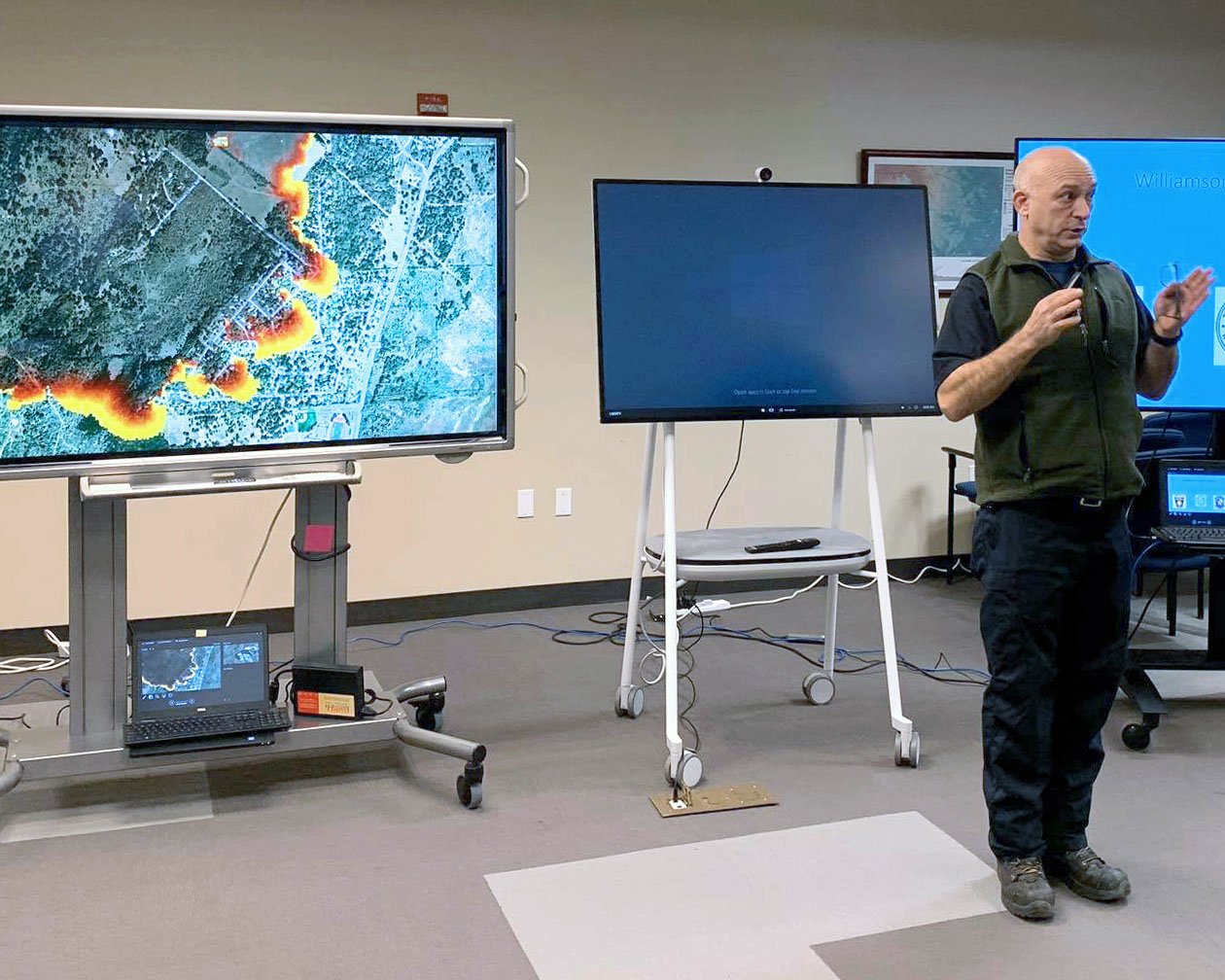
Region tests EOC capabilities, communications in exercise
The CAPCOG Homeland Security Division’s 2020 Regional Exercise, which took place in February, simulated large wildfires in three counties to…Mar 24, 2020
CAPCOG begins telework schedules amid COVID-19 pandemic
The Capital Area Council of Governments has moved employees to teleworking schedules beginning this week; some staff will be in…Mar 16, 2020
Regional Academy opens testing for would-be peace officers
The CAPCOG Regional Law Enforcement Academy (RLEA) will hold its first exam for prospective peace officer cadets for its 91st…Feb 11, 2020
CAPCOG purchases Stop-the-Bleed kits for local schools
The CAPCOG Homeland Security Division purchased more than 1,000 Stop-the-Bleed kits to help school districts and charter schools throughout the…Jan 21, 2020
New CAPCOG Executive Committee members elect officers
The newly elected CAPCOG Executive Committee, which conducts COG business regarding budgets, contracts, and general policies and procedures for operating…Jan 14, 2020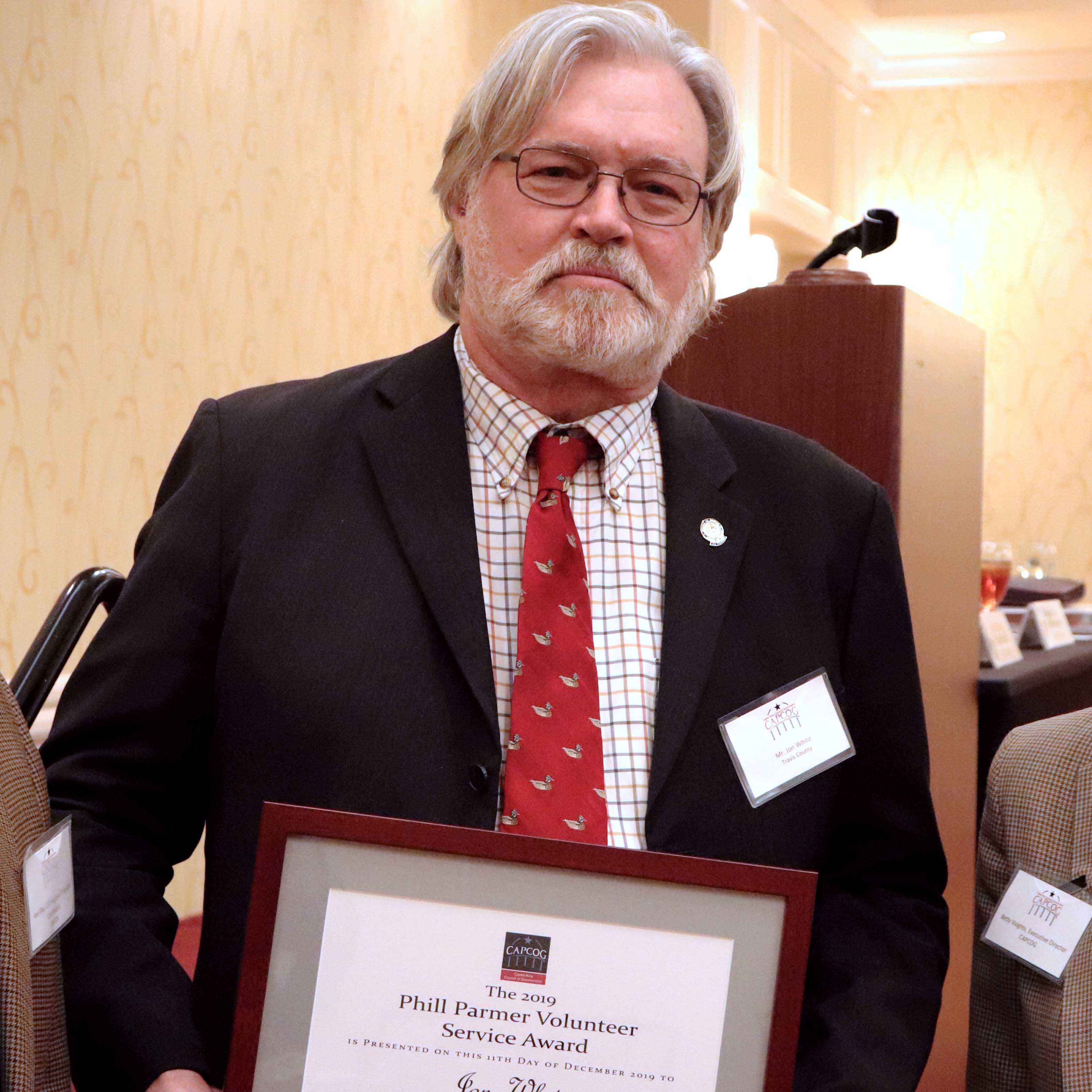
White gets CAPCOG Palmer award, CAPCOG gives air awards
Long-time Solid Waste Advisory Committee member, Jon White, received the 2019 Phill Palmer Volunteer Award during its annual membership meeting.…Jan 9, 2020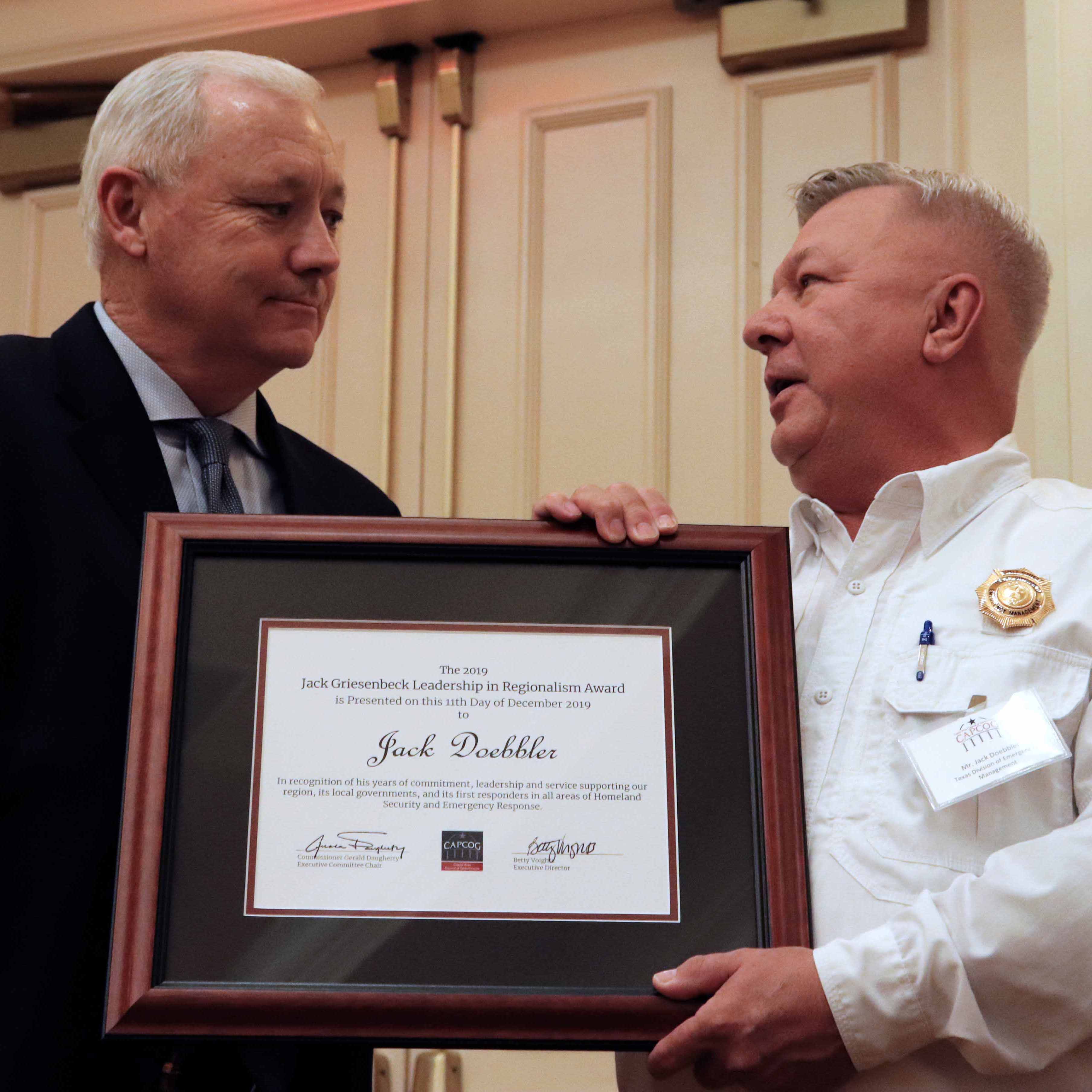
CAPCOG honors former TDEM District Coordinator for regional work
CAPCOG recognized the region’s former Texas Division of Emergency Management District Coordinator, Jack Doebbler, with its Jack Griesenbeck Leadership in…Dec 13, 2019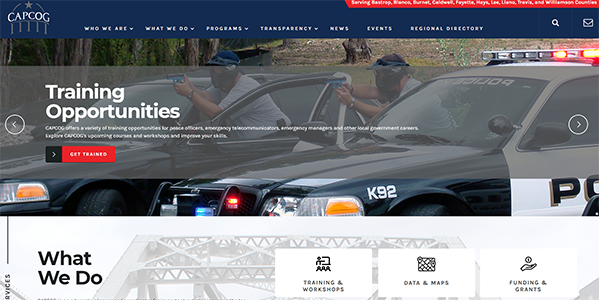
New CAPCOG website brings more info to members, partners
CAPCOG recently launched its new website at capcog.org to improve the organization of information, make it easier to navigate, and to update…Nov 26, 2019
CAPCOG hosts a national cybersecurity training course
The CAPCOG Homeland Security Division is offering a cybersecurity course for local jurisdictions’ Information Technology personnel. The 4-day Comprehensive Cyberterrorism…Nov 21, 2019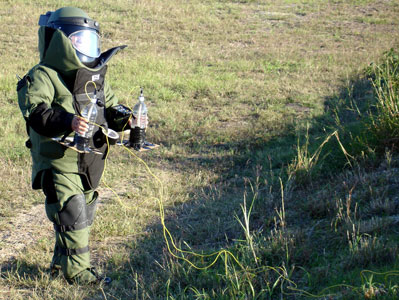
Homeland Security schedules mandatory grant workshops
CAPCOG will conduct three mandatory grant workshop for local jurisdictions planning to apply for 2020 State Homeland Security Program (SHSP)…Nov 19, 2019
General Assembly meeting to recognize regionalism efforts
CAPCOG will announce this year’s recipient of the Jack Griesenbeck Leadership in Regionalism Award along with other regional honors during…Nov 15, 2019
Homeland Security visits Education Service Center Region 13
The Texas Region 13 Education Service Center invited CAPCOG Homeland Security Director, Martin Ritchey, to discuss with school district officials…Oct 22, 2019
Homeland Security offers Type III All-Hazards Incident course
The CAPCOG Homeland Security Division is hosting a Type III All-Hazards Incident Management Team training from Nov. 18 to Nov.…Oct 17, 2019
CAPCOG taking regionalism, air quality award nominations
CAPCOG is seeking nominations for the 2019 Jack Griesenbeck Leadership in Regionalism Award, which recognizes a person whom emphasizes the…Oct 10, 2019
Nominations open for CAPCOG Executive Committee board
CAPCOG will begin accepting nominations on Wednesday, Sept. 11, 2019 from eligible city and county elected officials who would like…Sep 12, 2019
CAPCOG holds threat identification, evacuation workshops
The CAPCOG Homeland Security Division will host three courses in September to train peace officers, emergency managers and other local…Aug 22, 2019
Austin to buy Warn Central Texas kiosks to sign up residents
The city of Austin is purchasing and programing digital kiosks to give residents greater access in registering to receive emergency…May 28, 2019
Prepare for wildfire season by being Firewise and registering for WarnCentralTexas
Emergency management and fire officials and local advocates urged Central Texas residents to prepare for the 2019 wildfire season, which…May 16, 2019
CAPCOG recommends homeland security grants projects
The CAPCOG Executive Committee and its Homeland Security Task Force prioritized 40 projects that requested funding from the Texas Office…Apr 16, 2019
Standard Response Protocol training video instructs students on safety actions
Students will be better prepared to respond to terroristic incidents with a new educational video developed through a partnership between…Mar 21, 2019
Your Partner in Serving Older Adults, Persons with Disabilities & Caregivers
26 Apr 2024
09:00 AM to 12:00 PM
Online Training






